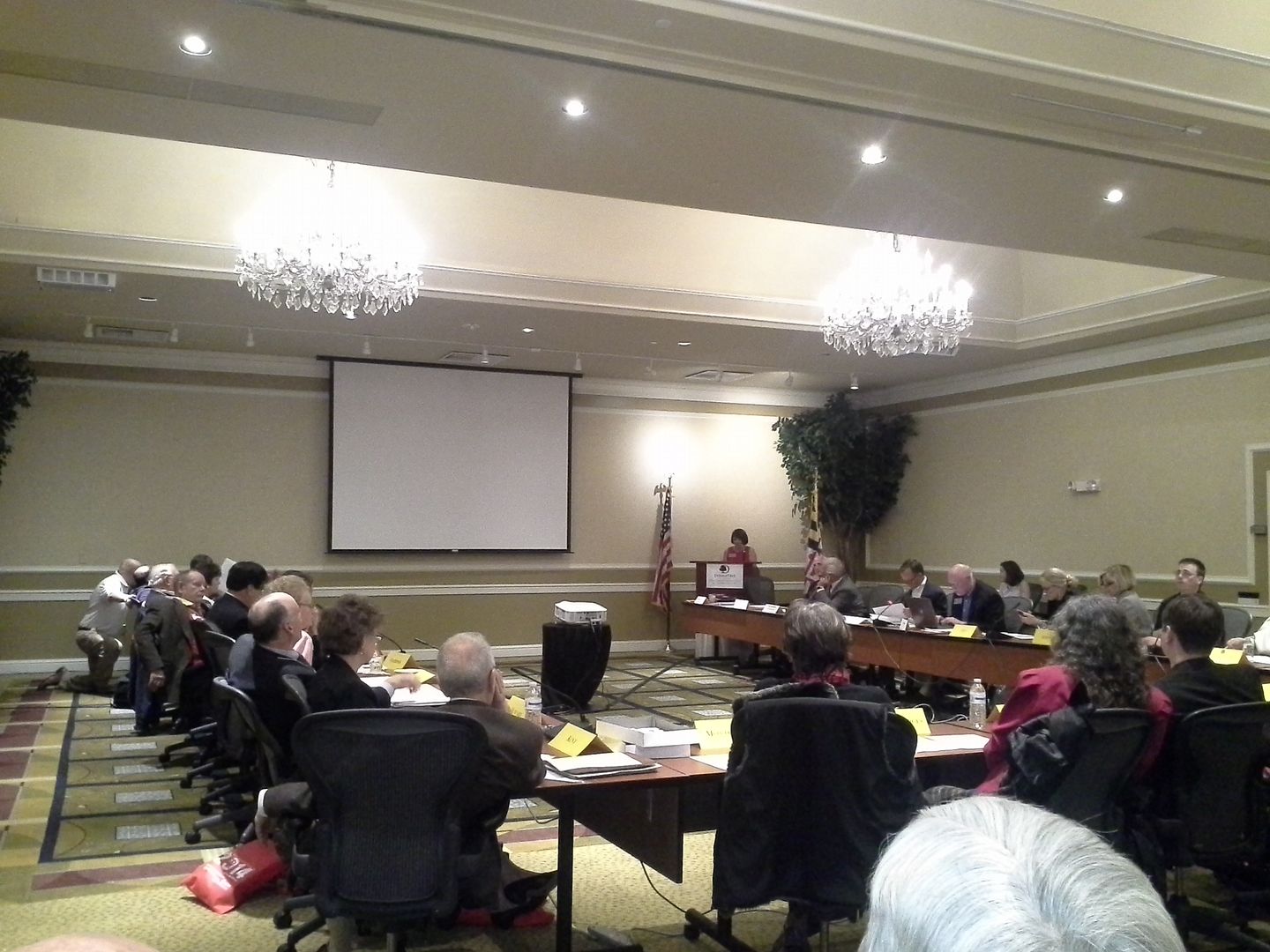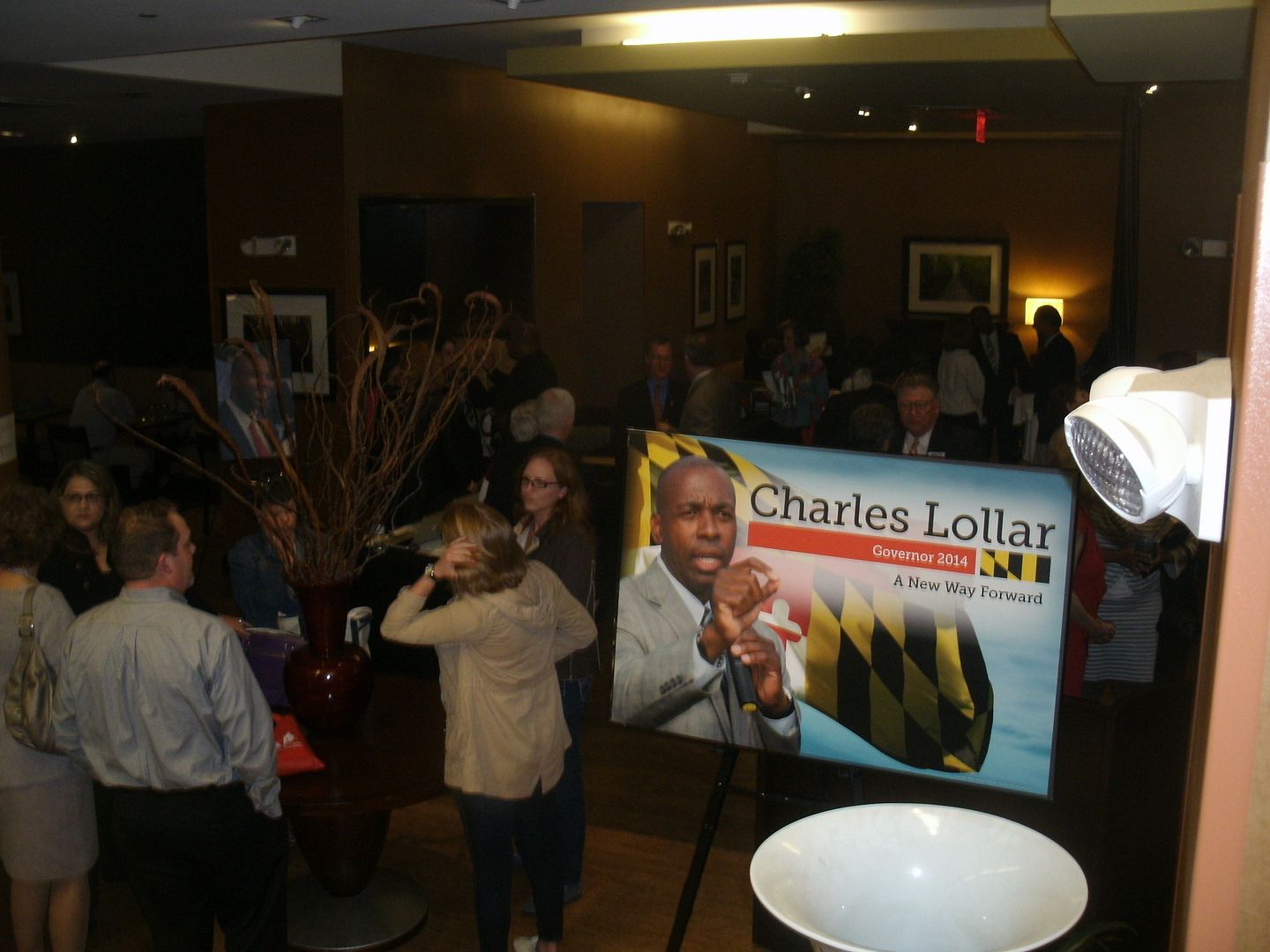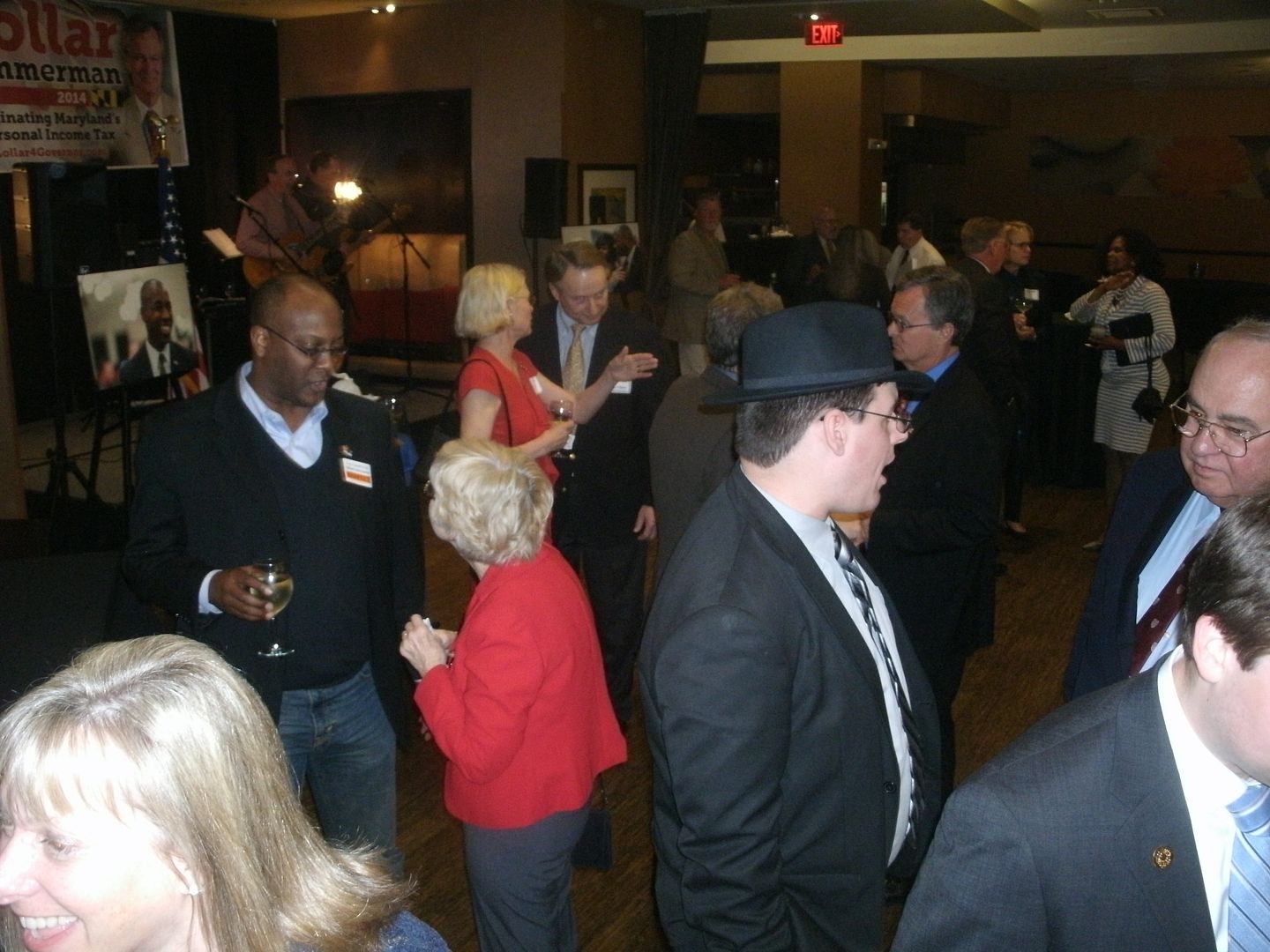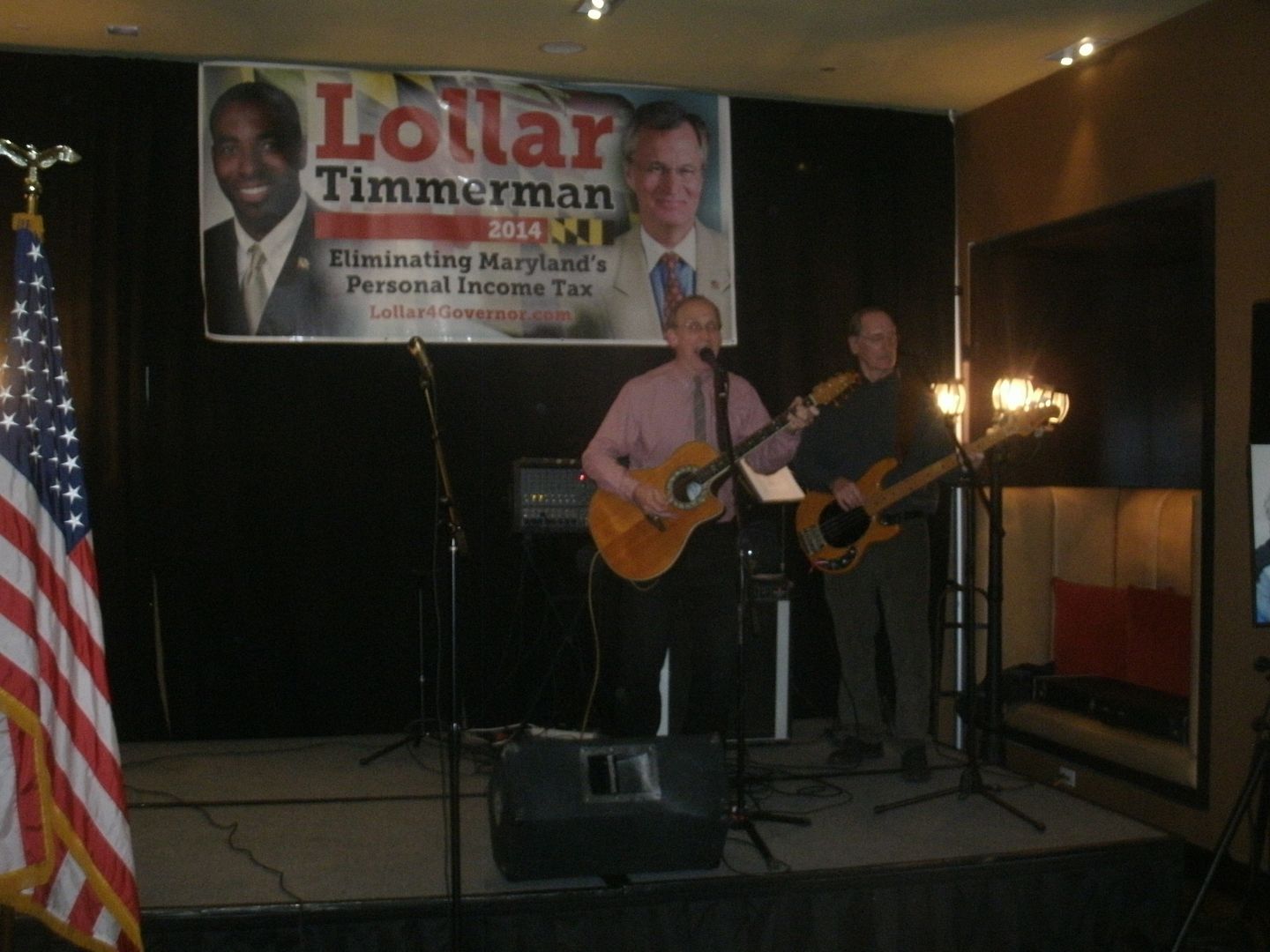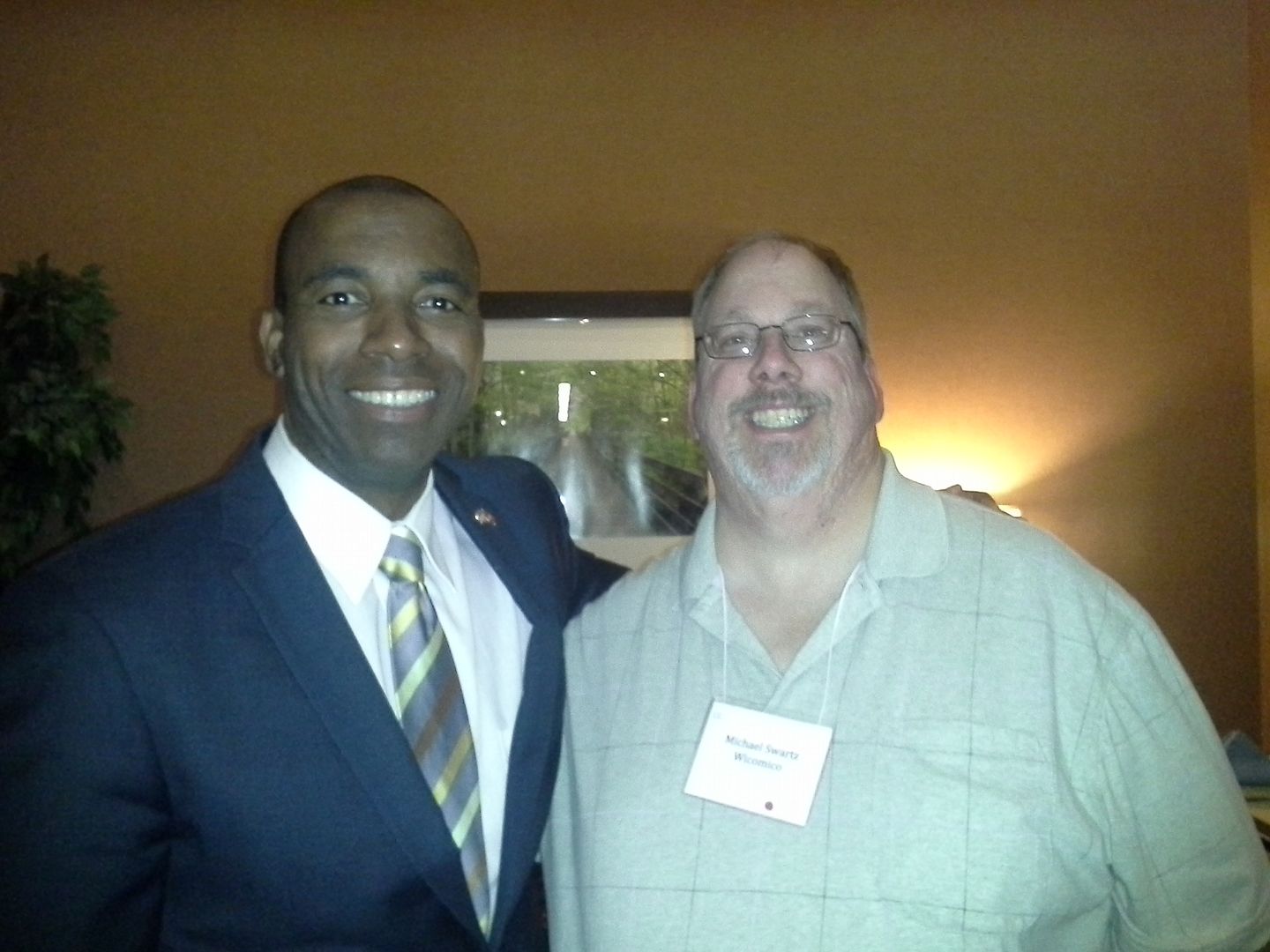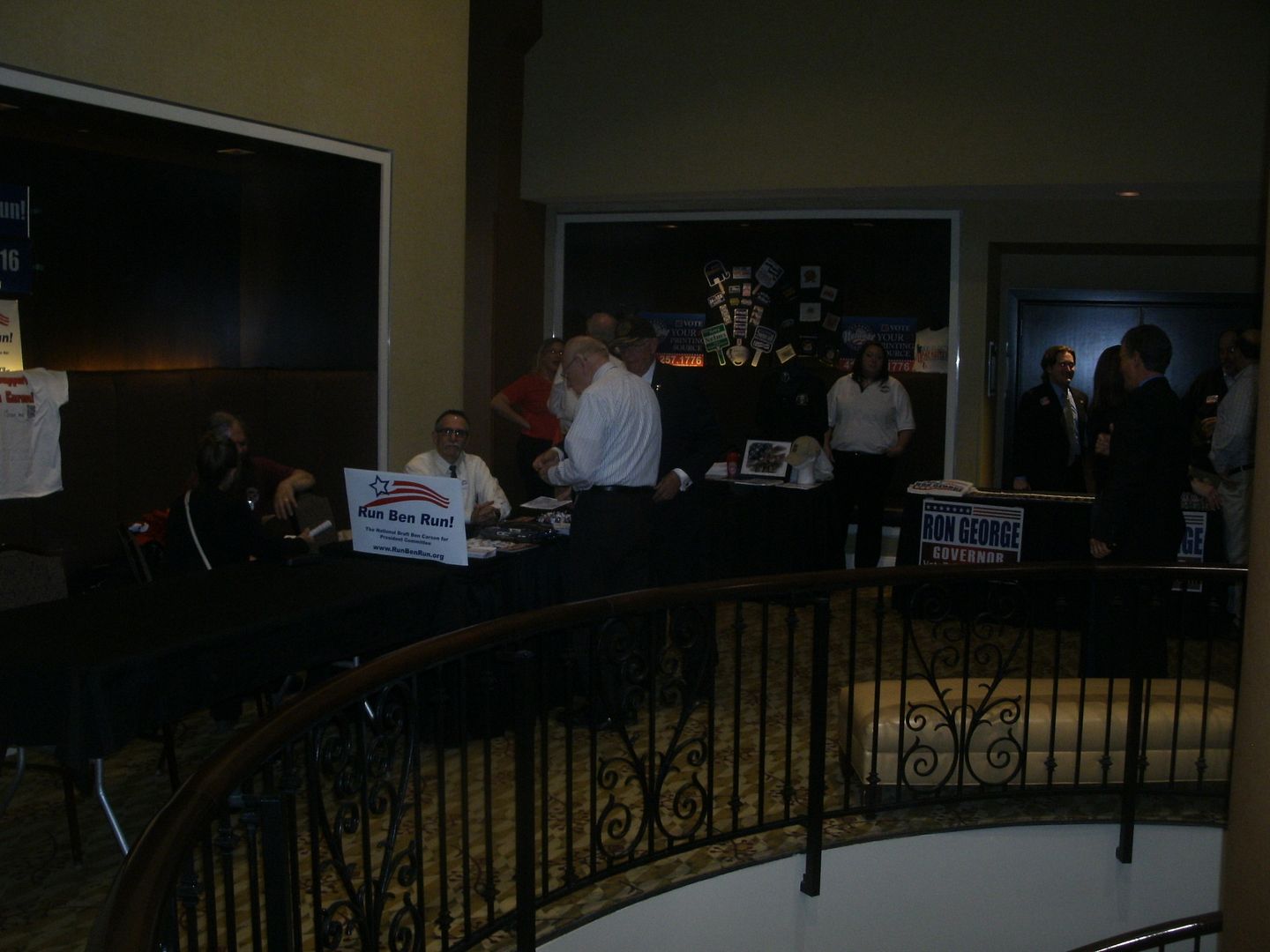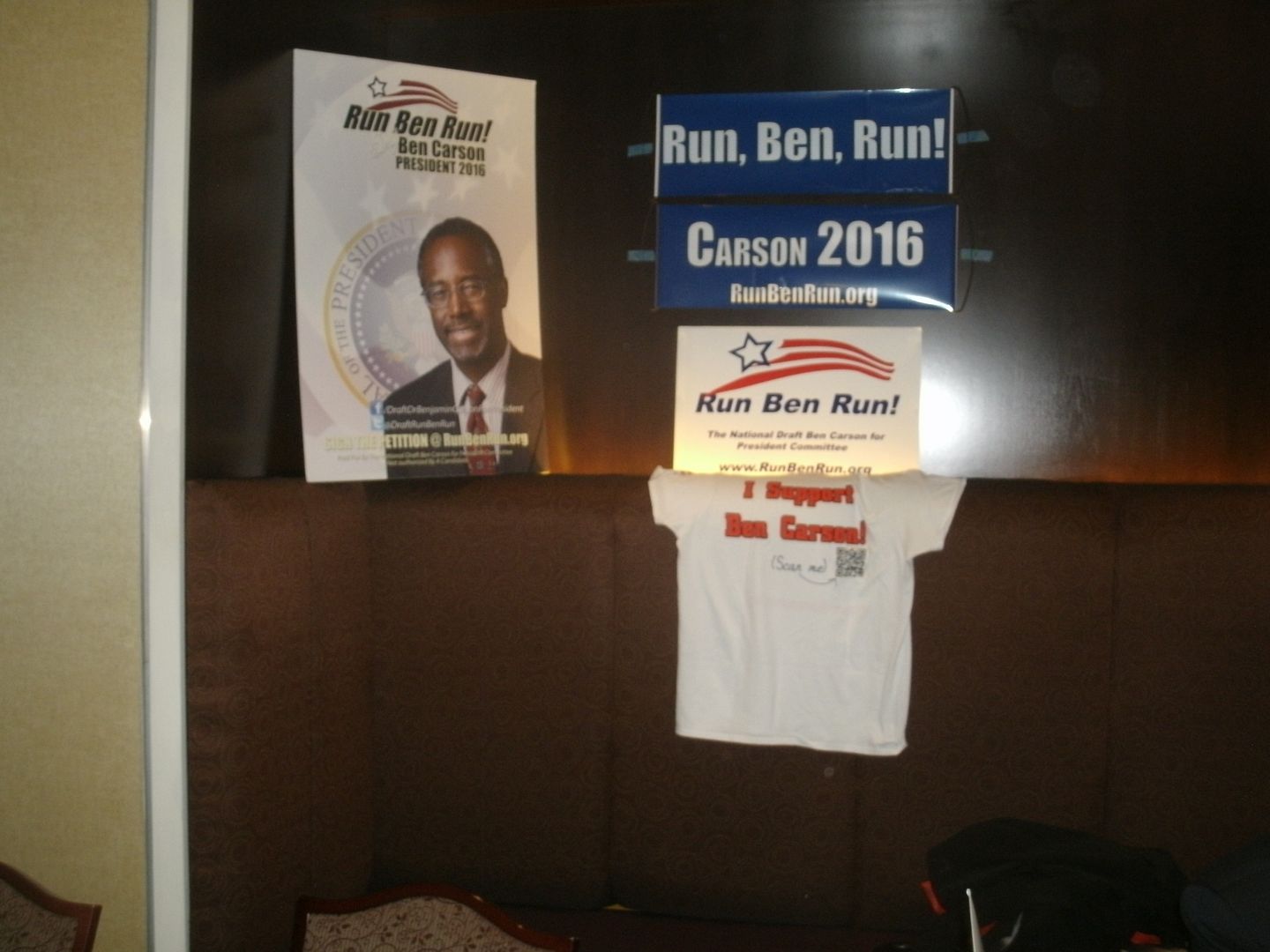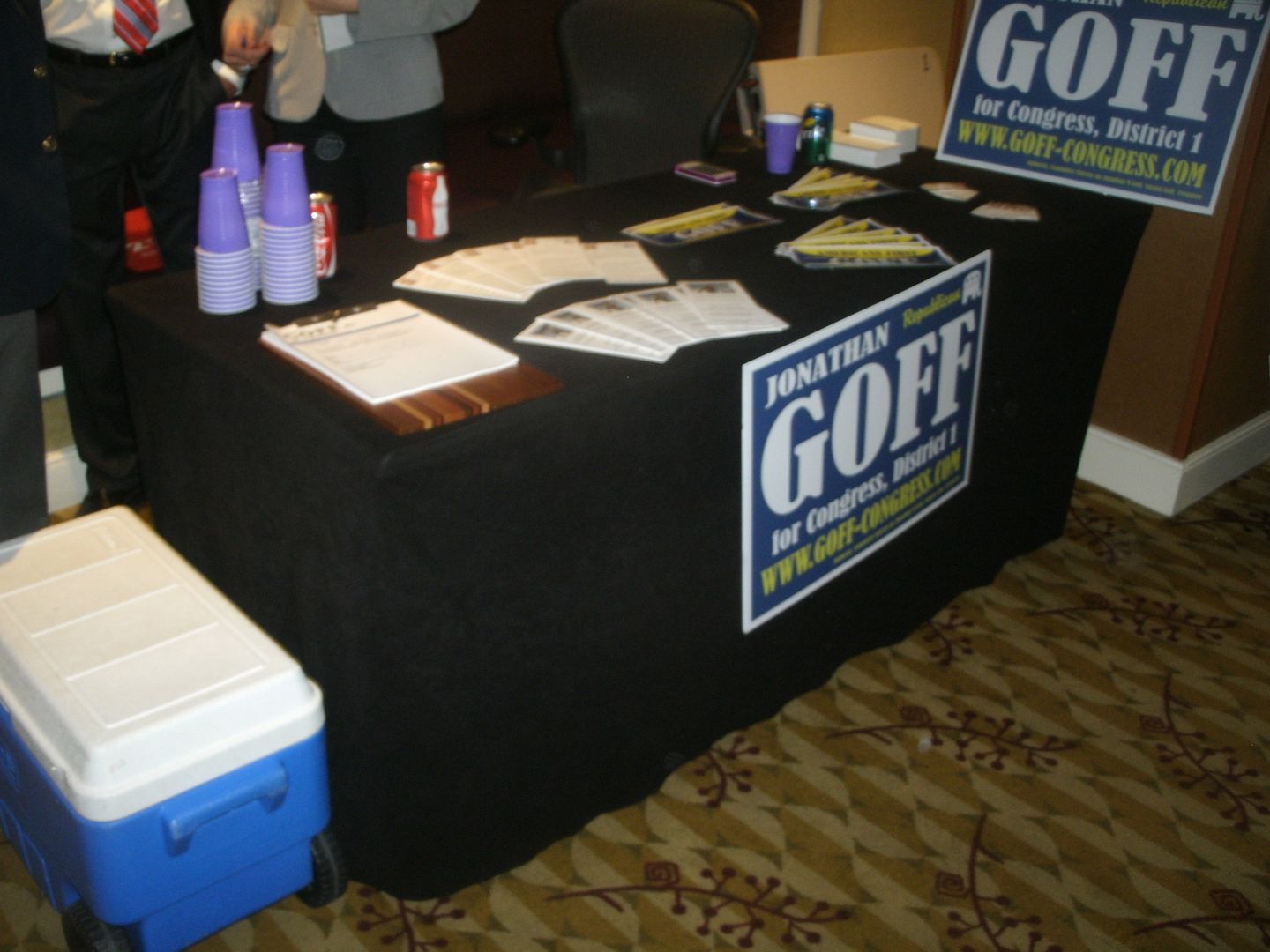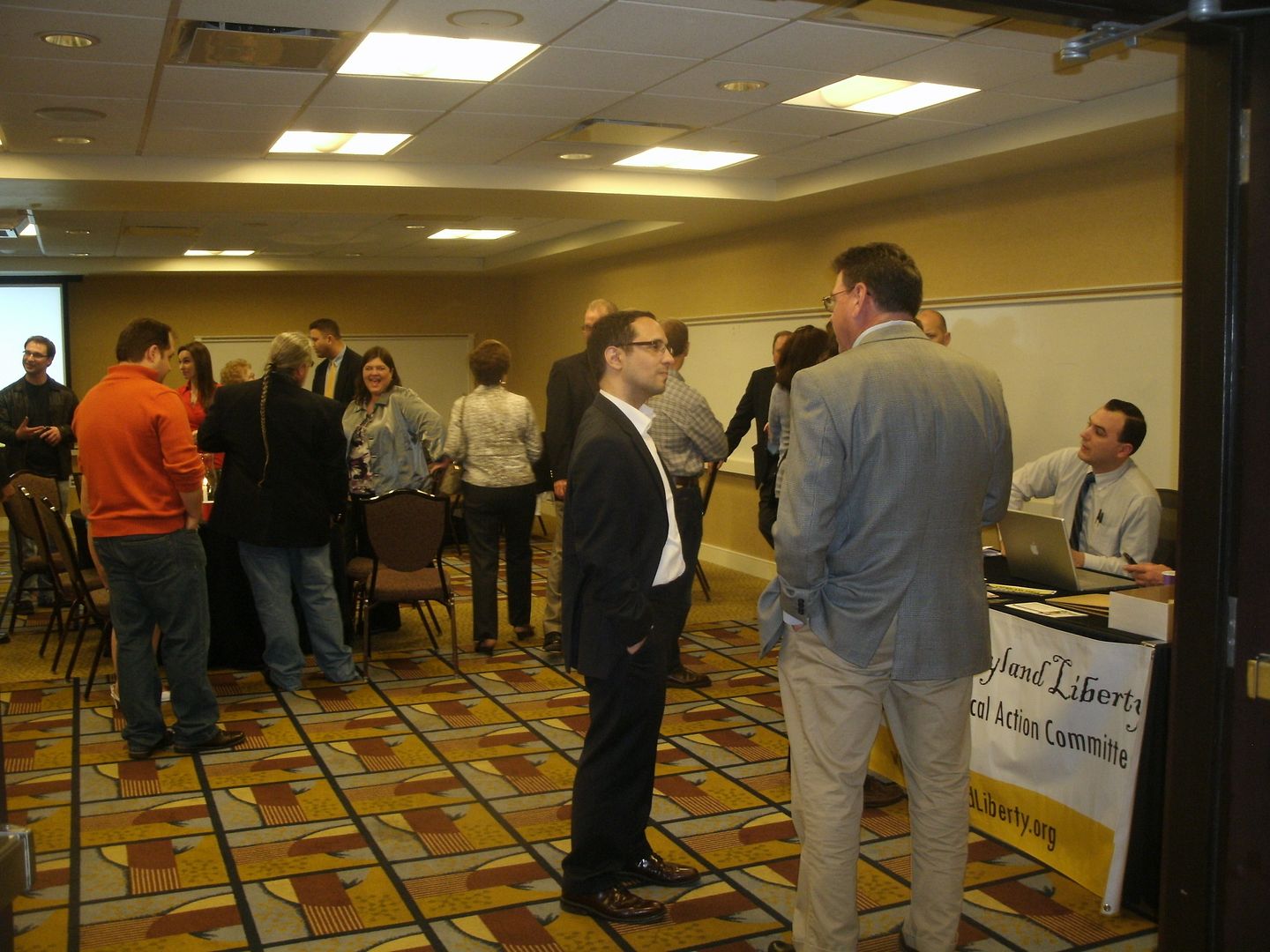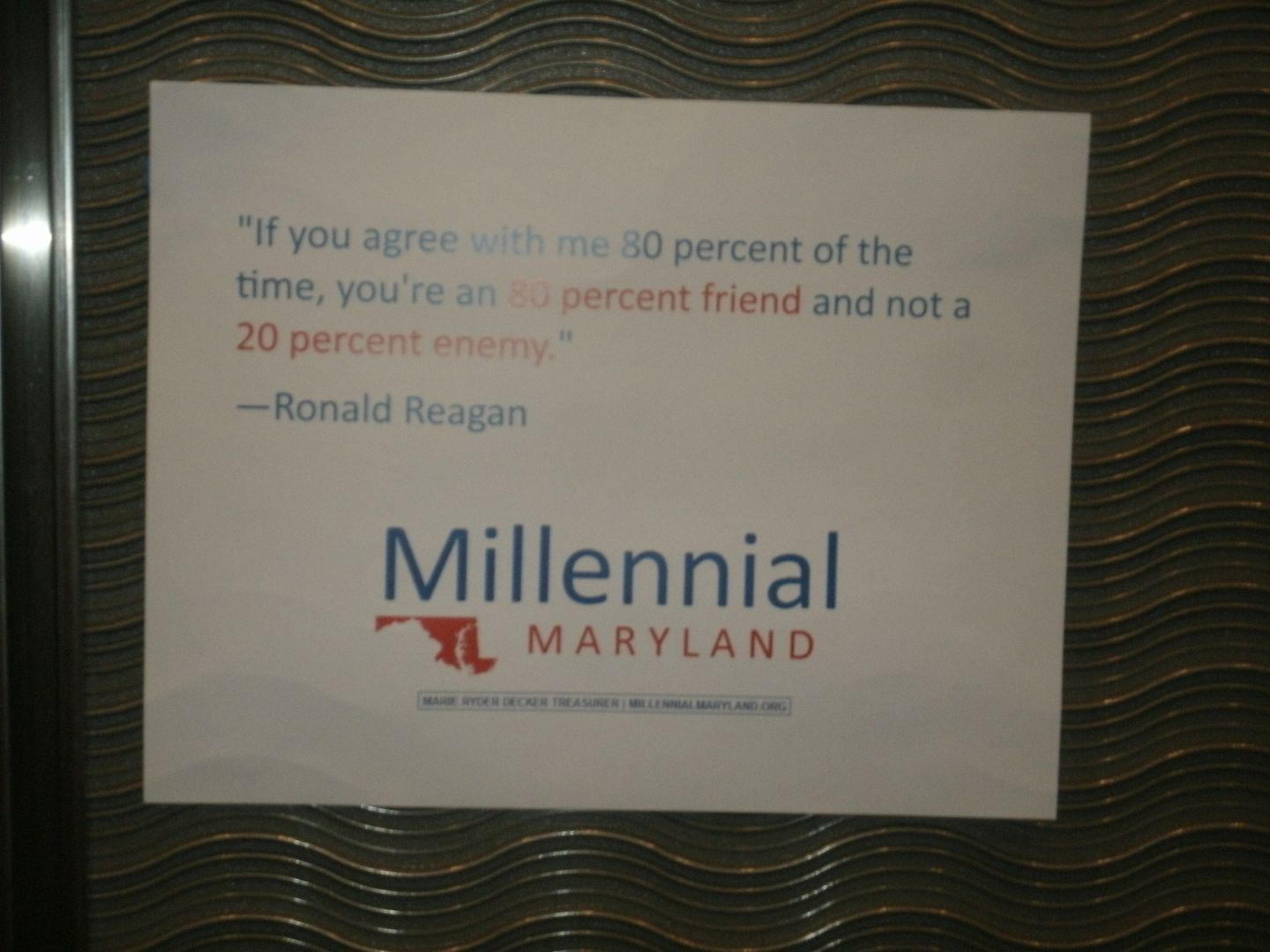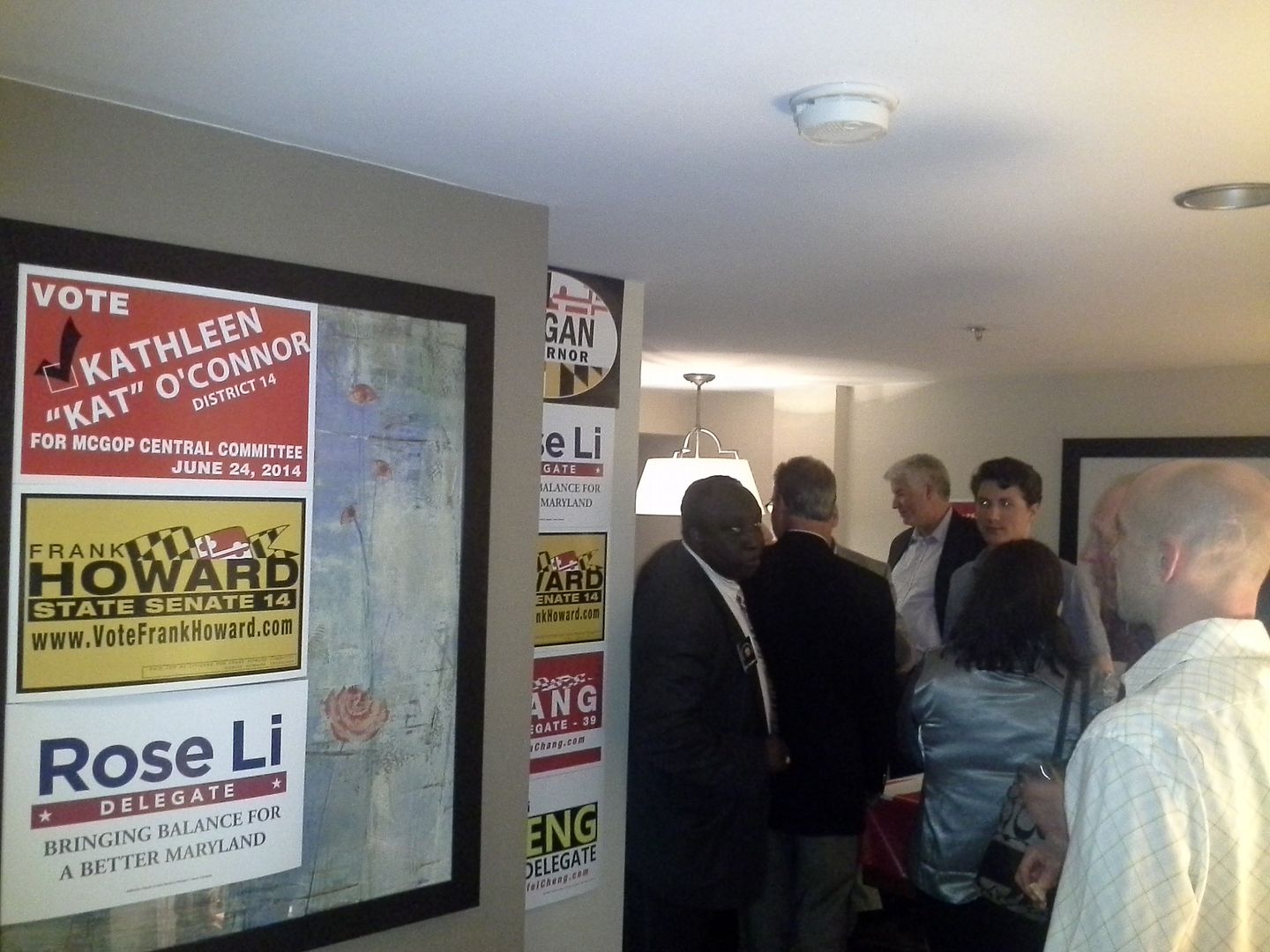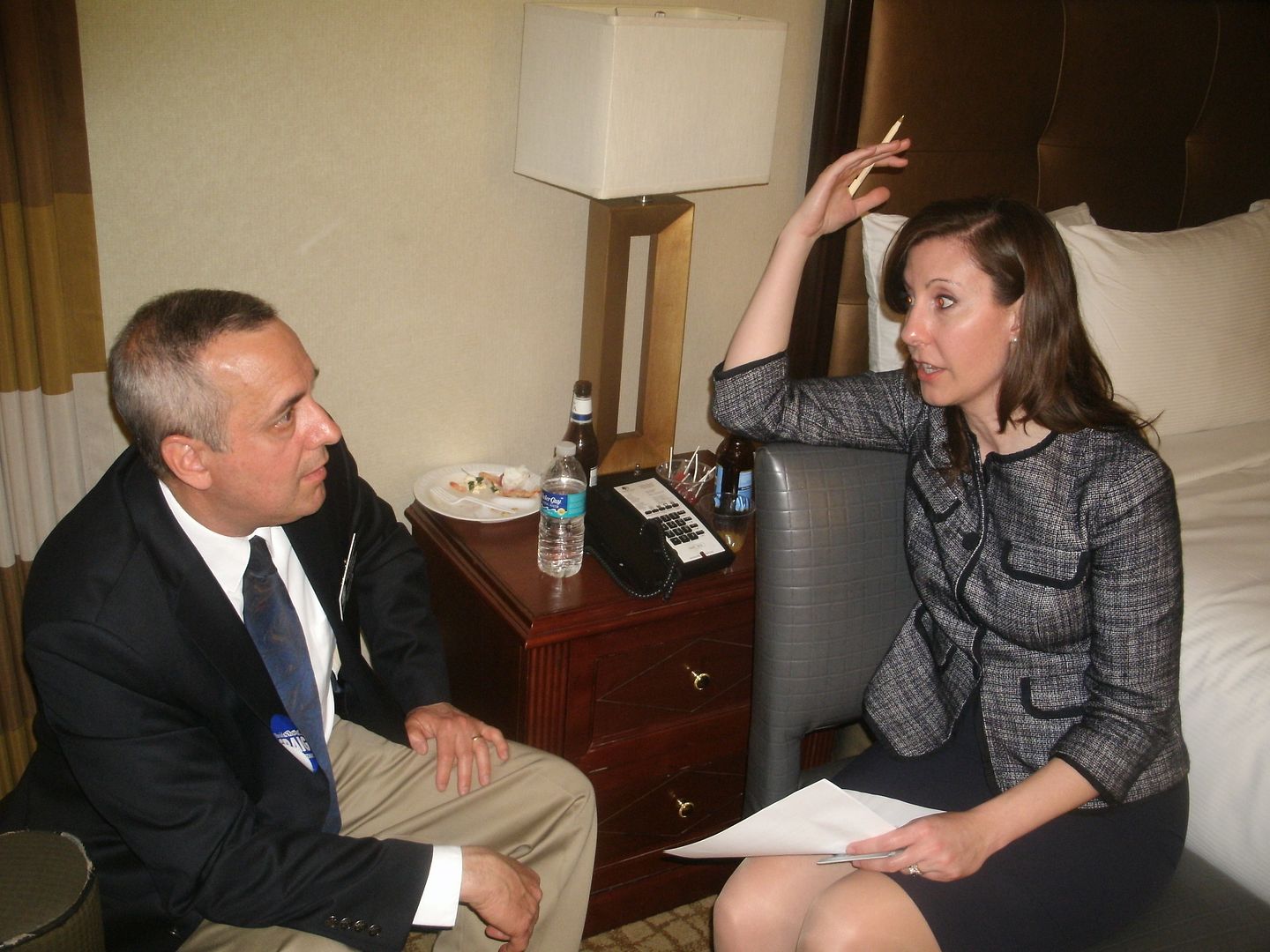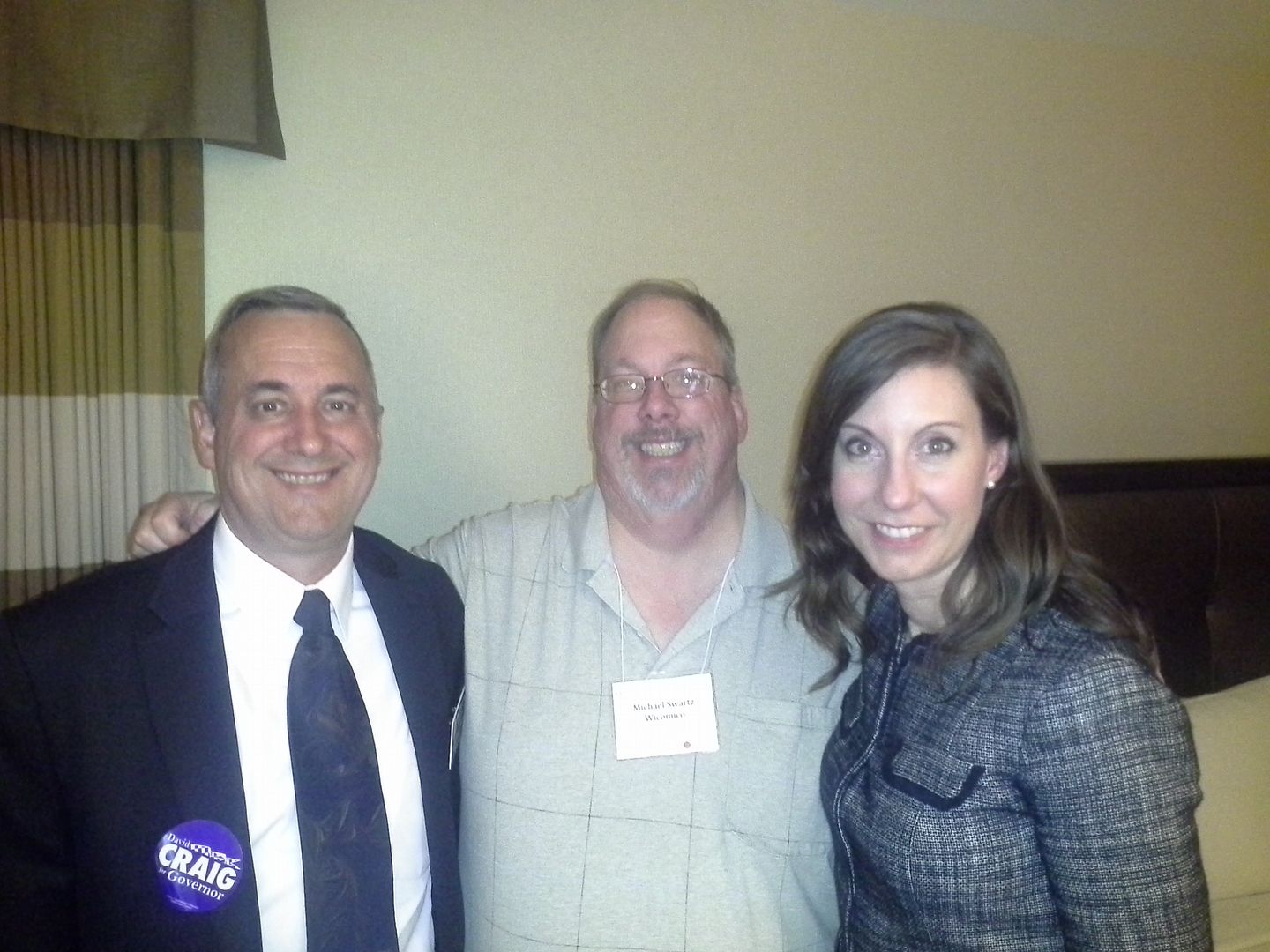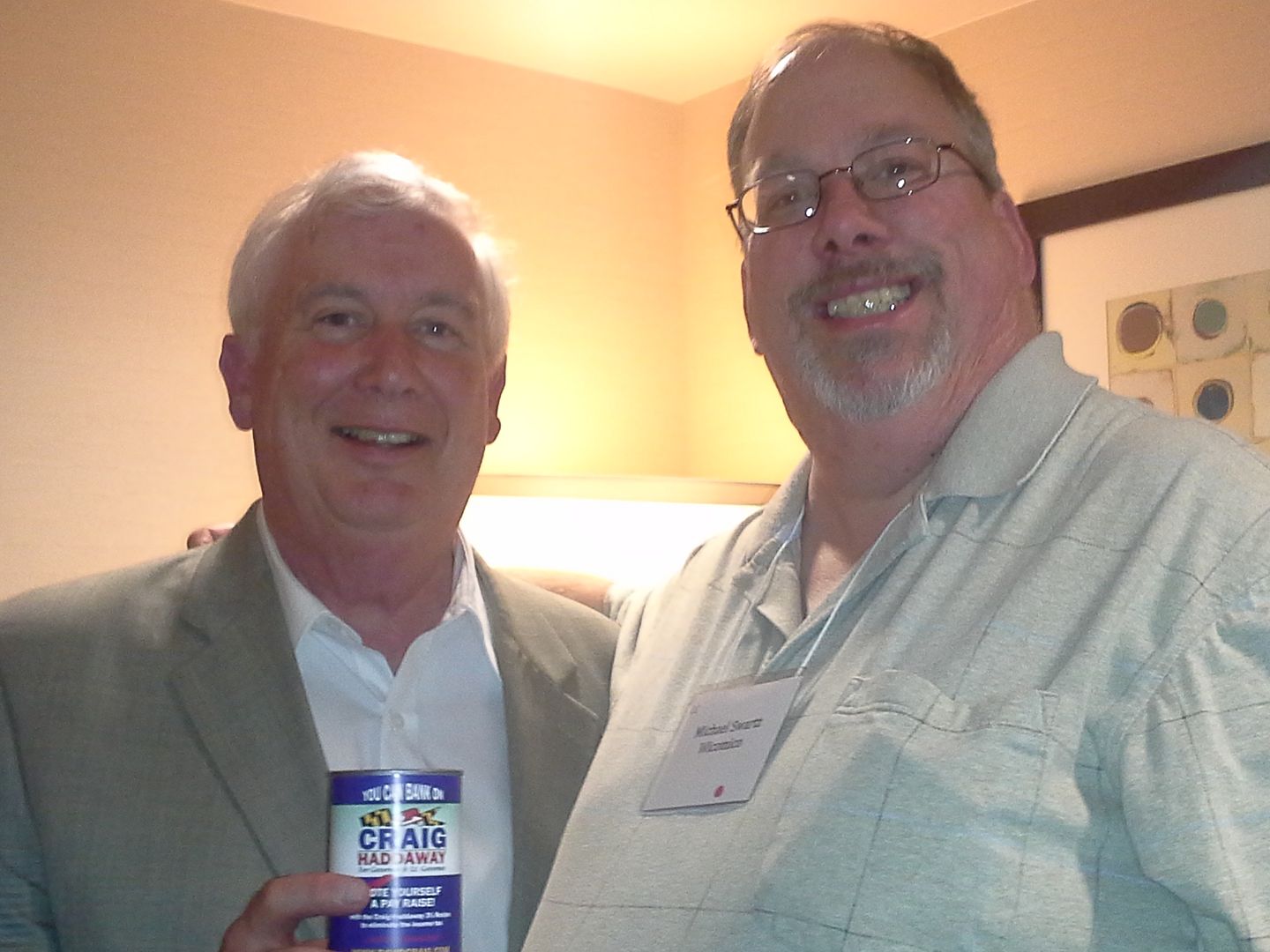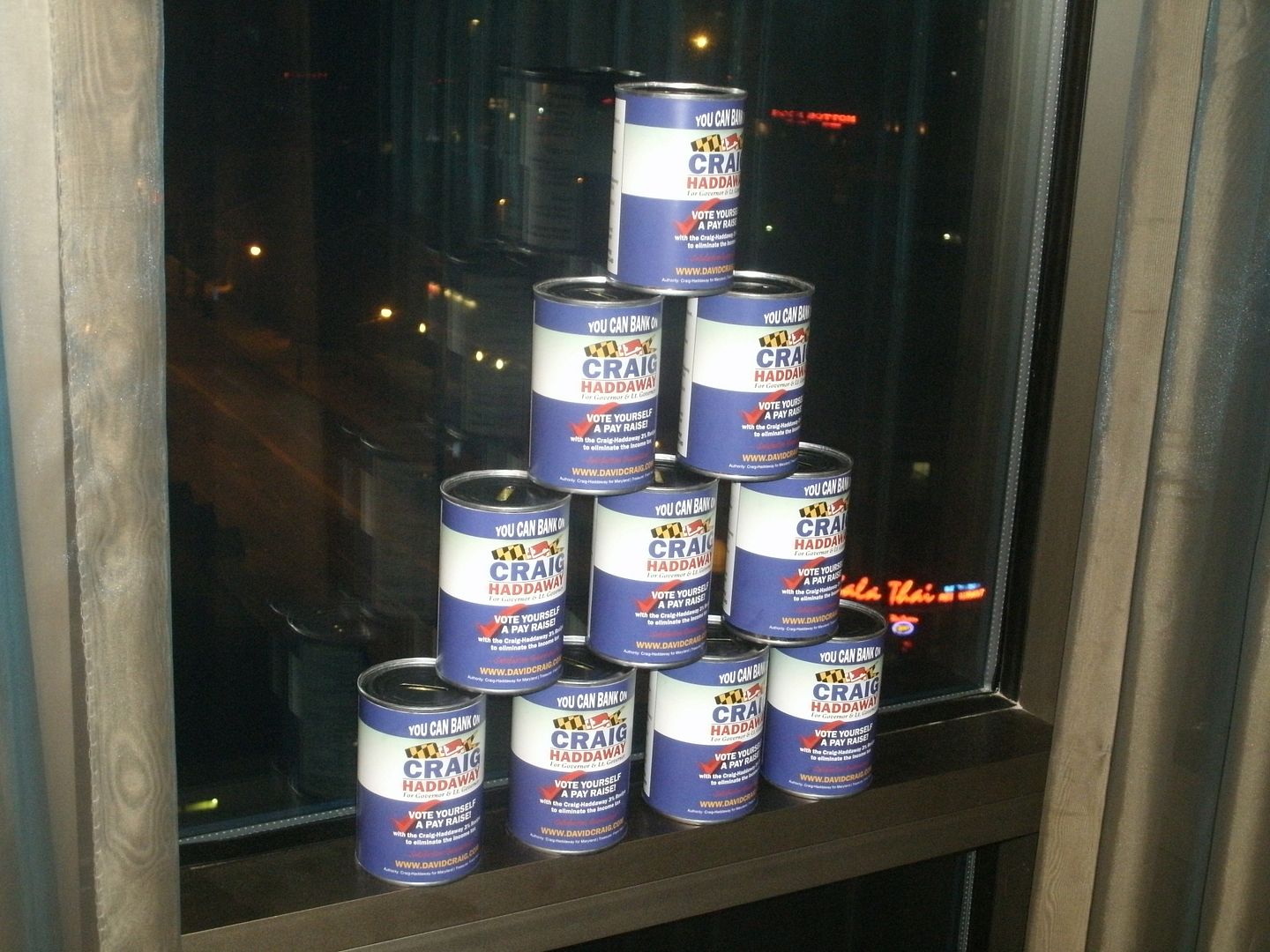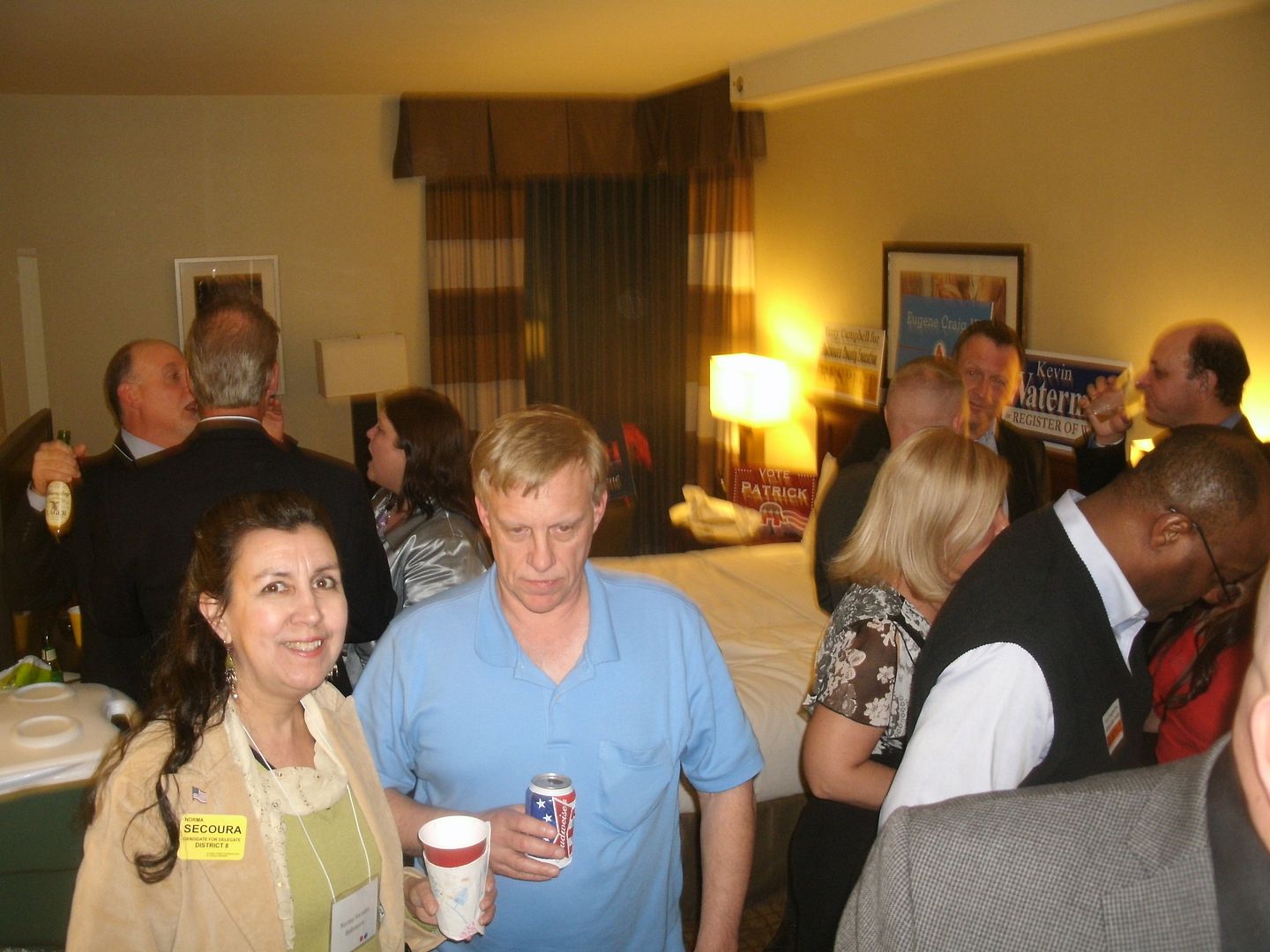
A new day dawned yesterday after a night of partying I described in part 1. Too bad it was about the last time we got to see the sun.
Instead, I went down to grab breakfast and remarks fron three U.S. Senate candidates. It should be noted that a fourth, Anthony Seda, “has never reached out” to the MDGOP, according to Diana Waterman.
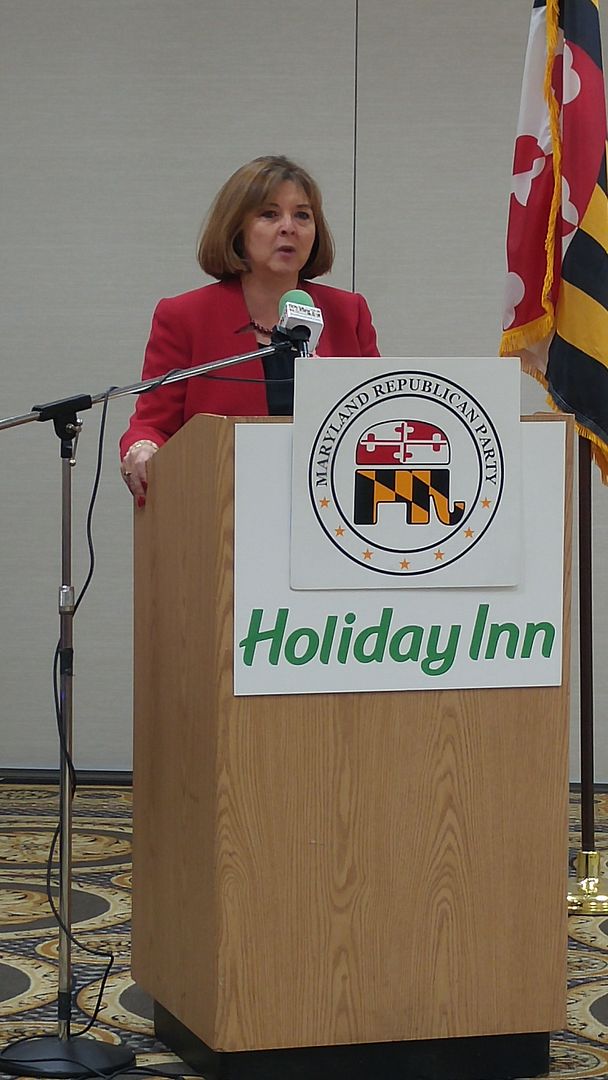
After an opening prayer where Delegate Deb Rey prayed that we “cruise to victory,” we did the speeches in alphabetical order. This meant Richard Douglas spoke first.
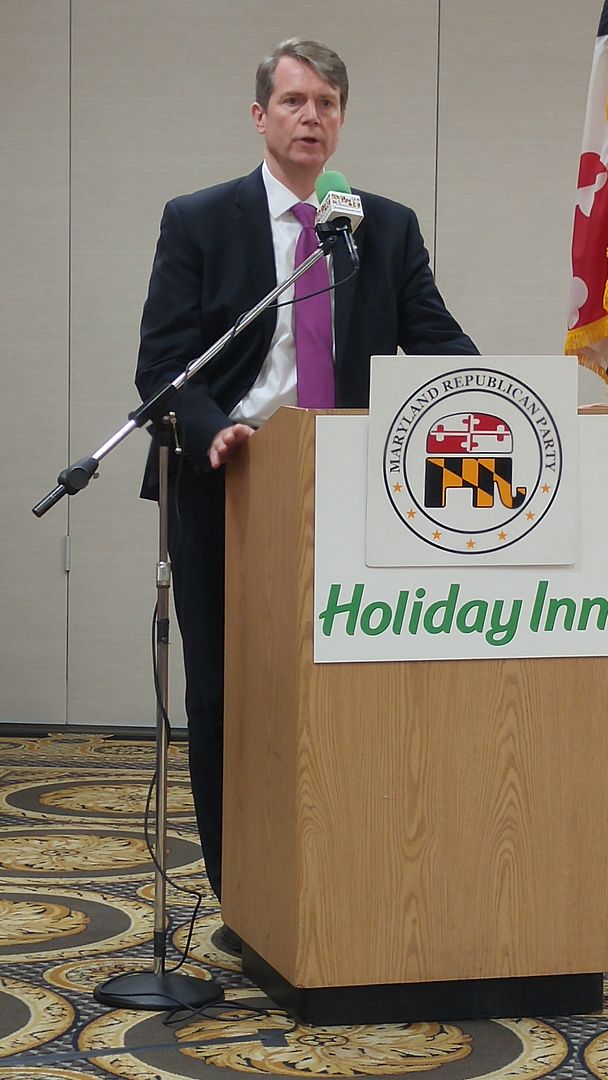
Richard noted the news was still filled with images from Paris, Belgium, and Mali, saying it underscores that “terrorism…remains a concern.” He added that the authorization to use military force passed after 9/11 remains in effect today.
He added that growing up abroad made incidents like the building of the Berlin Wall and Cuban missile crisis “indelibly etched in my mind.” But he assured us we are stronger than Russia – we just have a leadership problem. No one is pushing back on Russia, China, or Iran, he continued.
Douglas pivoted to domestic issues with a mention of the Bladensburg Cross, a court case he’s assisting on and one for which he predicted “we’ll take the wood to the humanists.” It led into his thought that the job of a Senator was not to pontificate, but to act. In Maryland, it meant not just doing what he could at the federal level to eliminate the rain tax and entice industry. One example of the latter was the Howard Street Tunnel, which is too shallow to accommodate double-decker rail cars. It’s a problem the current Senator has had 30 years to address.
“People who have three squares a day…don’t riot,” Douglas noted. With foreign policy experience and what could be described as a populist agenda, Douglas vowed “I intend to go to the Senate to make that place better.”
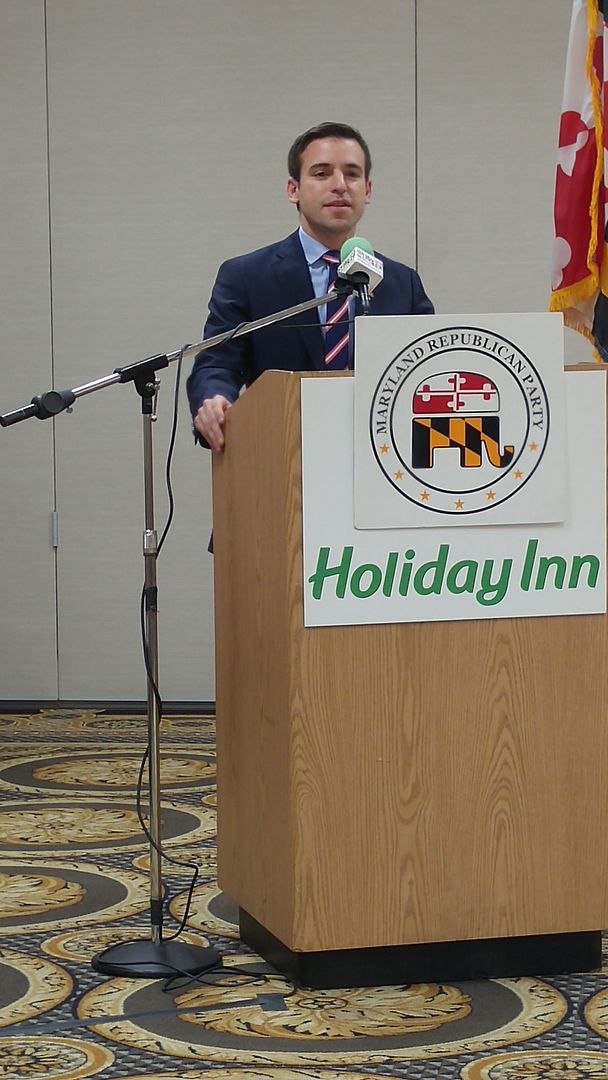
The son of Greek immigrants, Chrys Kefalas opened by saying, “I’m a story that’s brought to you courtesy of the American Dream.” He then detailed a life of precocious entrepreneurship as a teenage business owner who parlayed that success into law school and eventually jobs with Bob Ehrlich, both as Congressman and as governor. One of his accomplishments with the Ehrlich administration was pioneering criminal justice reform.
After a stint at the Eric Holder Justice Department working on a “smart on crime” initiative, Kefalas is now a vice-president at the National Association of Manufacturers. “Manufacturing is coming back,” said Chrys. America has the advantages of innovative and productive workers as well as affordable energy. Taxes and regulations were holding us back, he explained.
Yet he was quick to recognize “you are the ones who are going to make the party strong…the campaign is about you.”
Kefalas added that the task of the nominee is to win, and he would do so with his positive vision. In this “once-in-a-generation opportunity” to win the seat, Kefalas believed “I can get more Democratic crossover support than anyone else in the primary.”
“We need to expand the map in Maryland,” he continued. Through him “we have a path to victory.”
Kefalas concluded by noting his recent engagement, stating “I am a gay Republican.” But “we move our country in a better direction when we are together.”
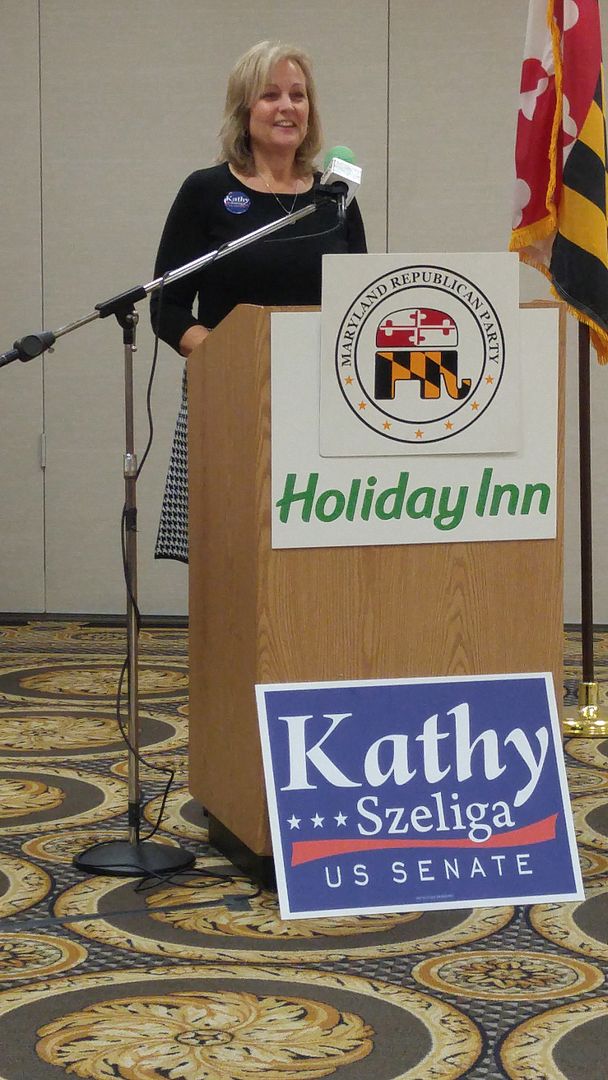
Kathy Szeliga emphasized her working-class background and that she and her husband Mark “believed in the American Dream.” For most of her life she’d played the various roles working moms did.
But Kathy stressed her more recent past, talking about how she and fellow Delegate Nic Kipke “brought some new ideas to Annapolis.” She also learned how to work across the aisle there.
With a new governor, Szeliga added, things were moving in the right direction – for example, we “repealed that darn rain tax.” (Actually, we only eliminated the ‘shall’ but kept the onus on counties to pay for the improvements.)
As for her Senate run, Kathy believed “there was a time that Congress worked,” but now government is too big, too gridlocked, and too distant. Indeed, “now is the time to turn Washington around…the American Dream is fading.”
Her pet issues if elected would be quality of life, security, and schools. Most of her remaining time was spent discussing the security aspect, noting that “terrorism is real…we must remain vigilant.” She vowed to support law enforcement as well.
Addressing her prospective opponents Chris Van Hollen and Donna Edwards, Szeliga opined they don’t understand the dangers we face from “radical Islam terrorists.”
In closing, Kathy pointed out her initial run of 61 endorsements and stated, “together we’re gonna get this done in 2016.”
So after Diana Waterman thanked her “three amazing candidates,” I had some time to spend in the exhibit hall before the morning session.
There I ran into Tanya Tiffany from MDCAN.
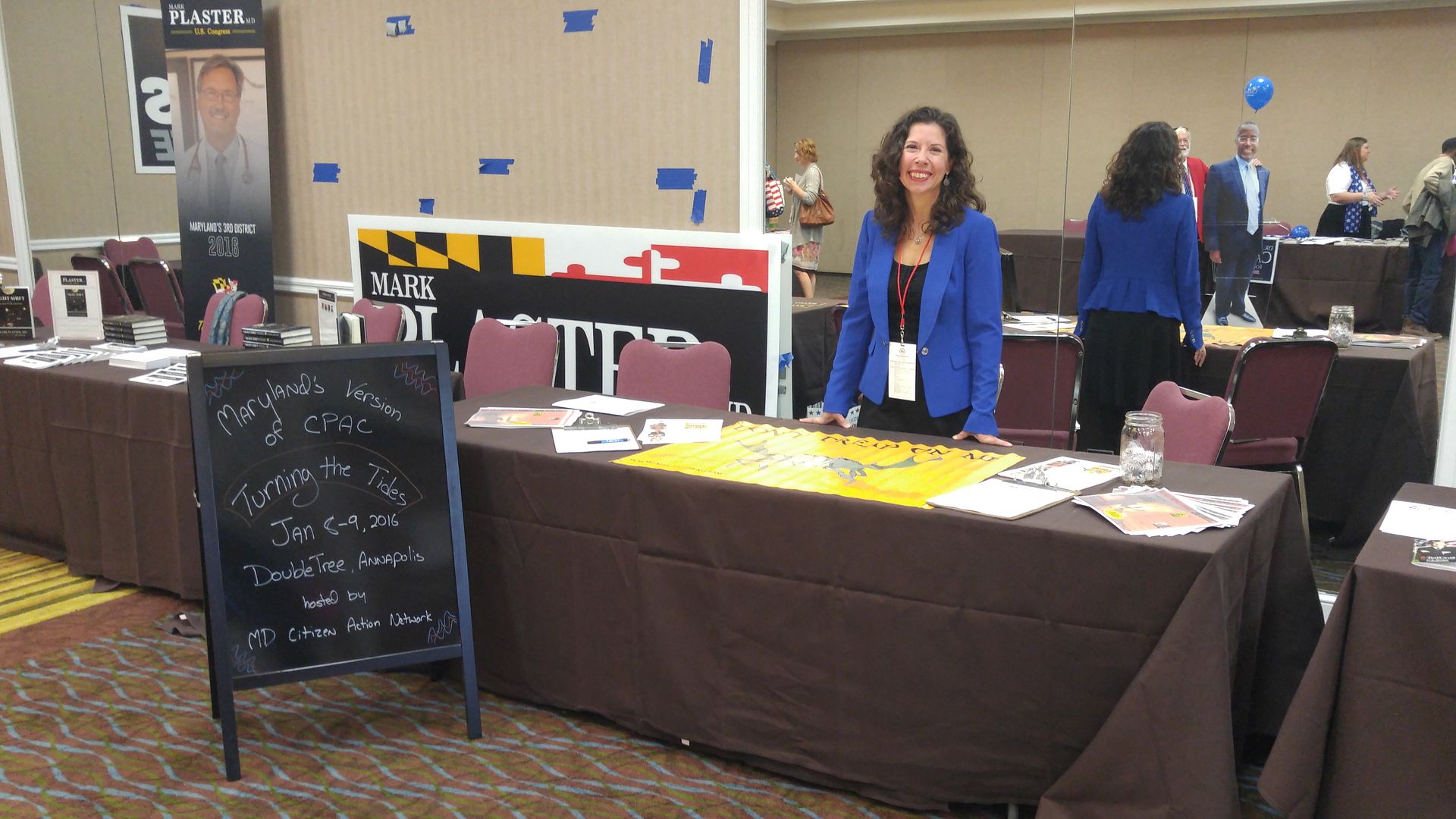
It’s a good moment to remind readers about the upcoming Turning the Tides Conference coming up January 8-9, 2016. I asked her if they would have a Blogger’s Row as in past editions and she said they were looking for a sponsor. They’re also changing the format a little bit to be more like previous editions, so it should be informative and more like “Maryland’s version of CPAC.”
With the convention opening, we were welcomed by Senator Steve Waugh.
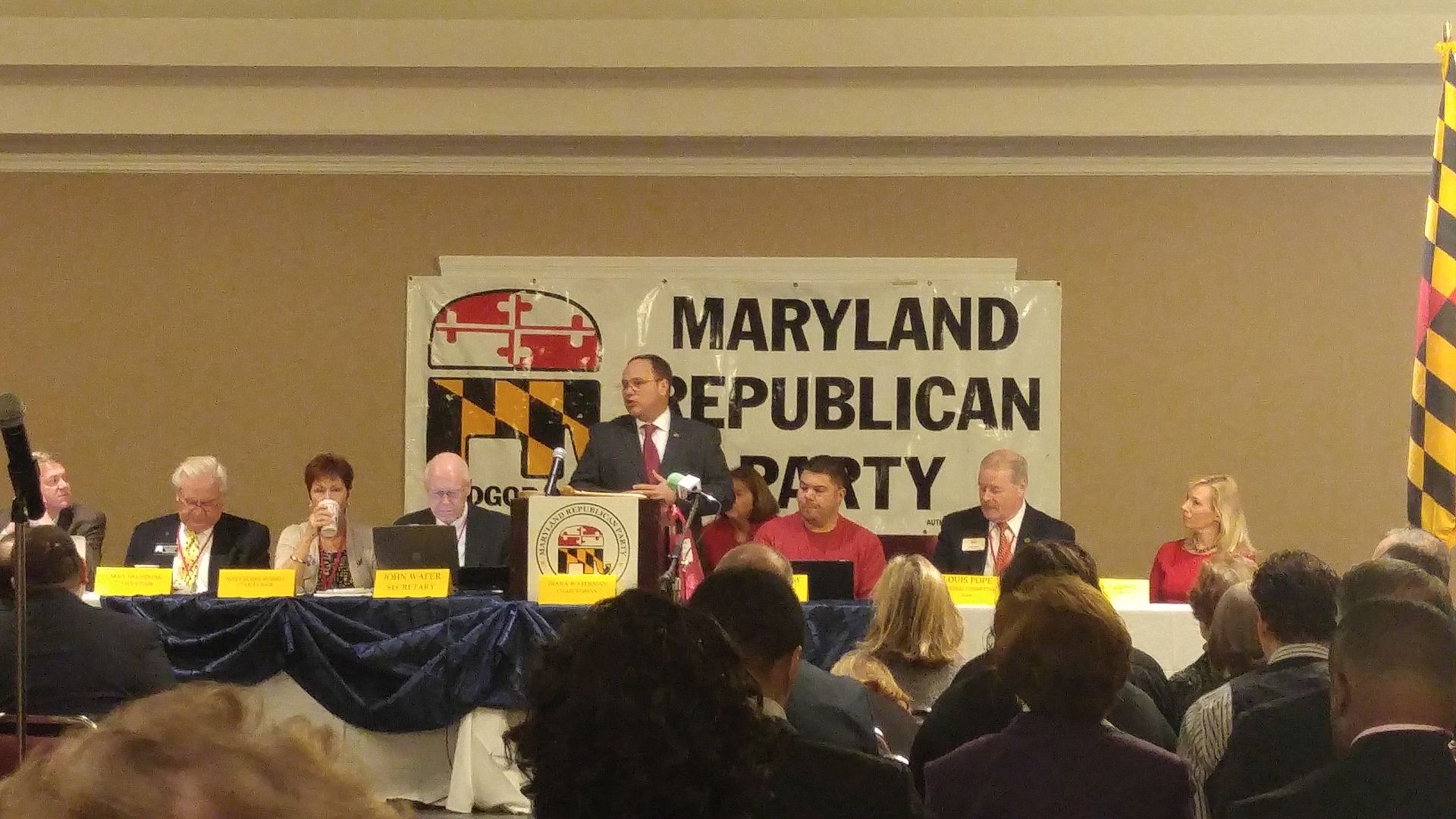
In his remarks, Waugh focused on the fact this part of Maryland “gave freedom of religion to the world” with the passage of the Tolerance Act in 1649. In the here and now, Waugh believed Governor Hogan “made the perfect call” regarding Syrian refugees, noting “you must ensure our safety.”
In another bit of history, Waugh pointed out that 15 years ago Calvert and St. Mary’s counties were about 2-1 Democrat but now both have a GOP majority.
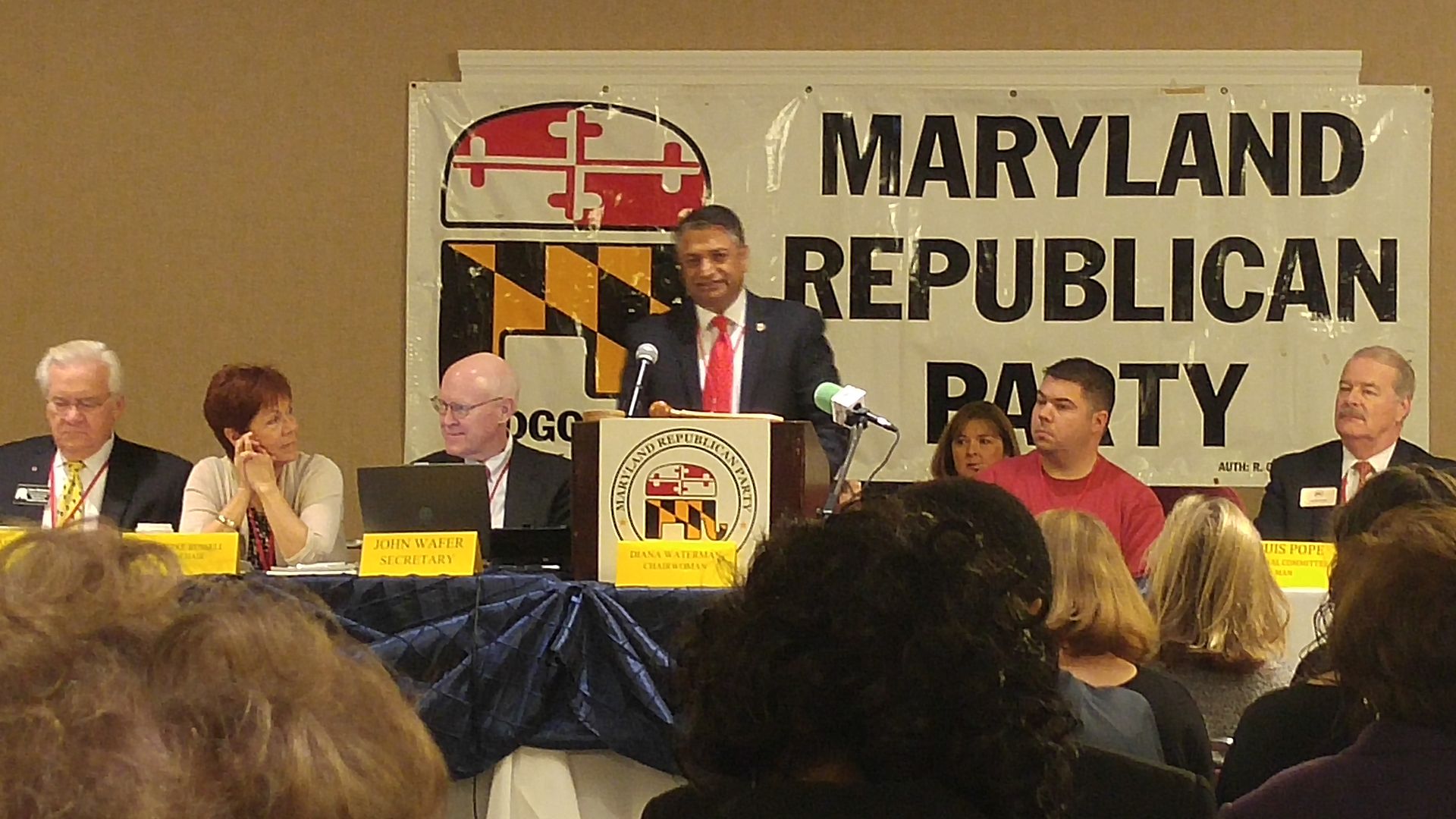
Since Larry Hogan was at the RGA meeting and Boyd Rutherford had a previous personal engagement, it fell to Secretaty of Human Resources Sam Malhotra to extend the governor’s greetings. He went through a laundry list of accomplishments by the administration over its first year, but concluded with the remark “I can’t wait for the next seven years.” He believed we were in the process of changing Maryland from deep blue to “baby blue” to purple to red.
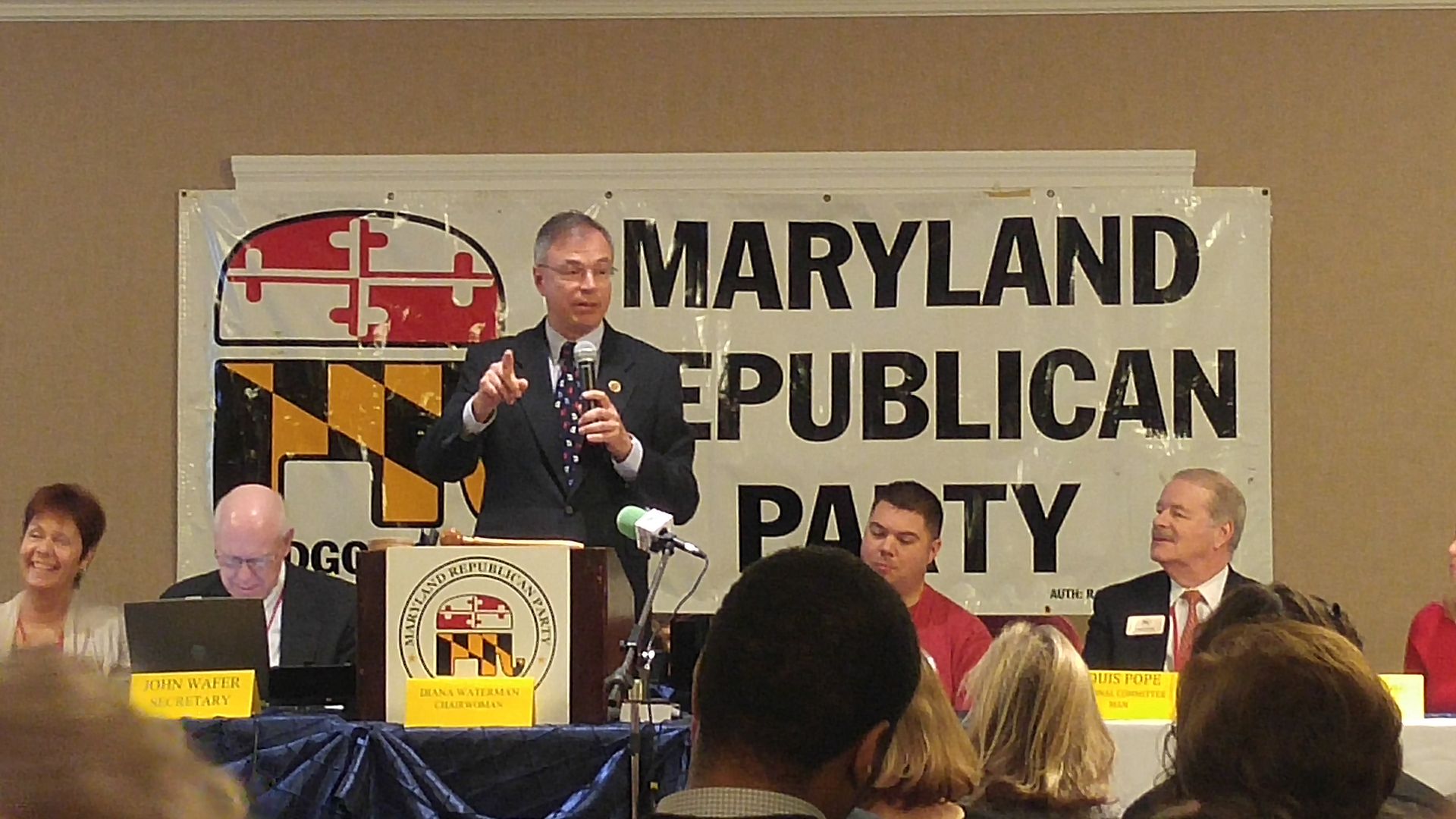
Congressman Andy Harris supplemented Malhotra’s remarks by saying he’d work hard to get five more Senators in Larry’s second term. “What a difference a year makes,” he added, also maintaining “this is not a deep blue state.”
As far as Congressional leadership, Harris believed it was the right time to change leadership. Paul Ryan can deliver our message, as opposed to John Boehner. “I don’t believe he communicated well,” said Harris. Andy also believed Speaker Ryan had his priorities in order, putting family first. “It doesn’t take a village, it takes a family,” said Harris.
Turning to the economy, the Congressman was waiting for the “last shoe to drop,” meaning an inevitable interest rate hike. If rates rise to their historical rate of 2 1/2% it would mean $500 billion a year in interest payments alone – more than we spend on defense. “The economy is not going to get better” under Barack Obama, he added.
Obama’s administration is also promoting the message that law enforcement “is our enemy.” Yet this is a time where we had a real enemy. “What Paris showed us is that 9/11 is not over,” said Andy. Add in the Russian airliner and the Mali attack, and it was no wonder France took action. Hollande “figured it out” that Obama wouldn’t take charge. “This is a setback to him,” explained Harris.
The narrative that ISIS is contained falls flat to Harris as well. “ISIS is here in the United States,” said Harris. “We have to declare war on ISIS.” Moreover, “we have to fight the war on ISIS as a war to win.”
Looking back to the state party, Harris believed we were on a roll and the Democrats were worried. Now we have to recognize the importance of local elections and raise money for the local Central Committees. “Only 350 days until Election Day,” Harris concluded.
We then heard from Steve Waugh again, who gave the Senate portion of the legislative update. “The magic number today is 19,” he said, referring to the number of Senators required to sustain a veto.
He predicted the next session “will be all about Baltimore,” adding that the budget will also come through the Senate this year. Other items to watch out for: paid sick leave, body cameras for police, K-12 education funding, a bottle tax, and “death with dignity.” We also have to figure out how to come up with over $1 billion to service O’Malley’s debt, Waugh added.
While the Democrats would try to sandbag Governor Hogan by laying traps for him to spring in 2018, Waugh advised us to “stay focused on the message.”
Wearing her Delegate hat, Kathy Szeliga urged us to join the Governor’s press list so we could spread the word about his successes. She harped on the $17,000 per pupil Baltimore City Schools spends, saying we were committed to education but also to accountability. How much is enough?, asked Szeliga.
She added there were some successes from the House on the Second Amendment as we ended ballistic fingerprinting, made it easier for armored car personnel to get permits, and removed some accessories from the SB281 ban list.
Finally, Kathy urged us to “answer back” to Democratic fundraising.
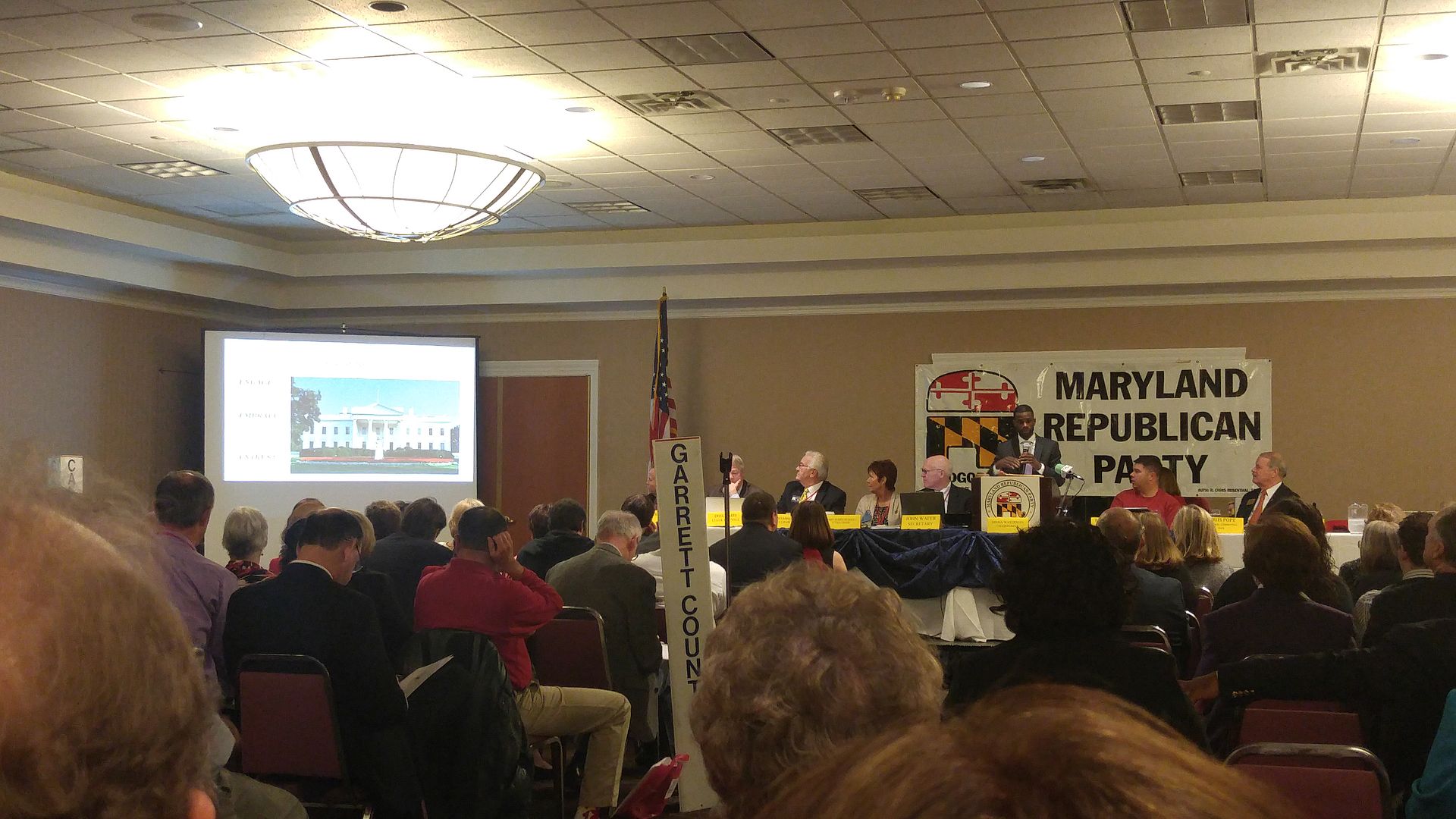
Shifting gears, we heard from Lucas Boyce of the RNC regarding their new philosophy to “engage, embrace, entrust” and the Republican Leadership Institute. Diana Waterman was working to bring some RLI graduates to work here in Maryland.
Boyce wrapped up the morning session, so we adjourned for two seminars and lunch. The first seminar I went to featured Nicolee Ambrose.
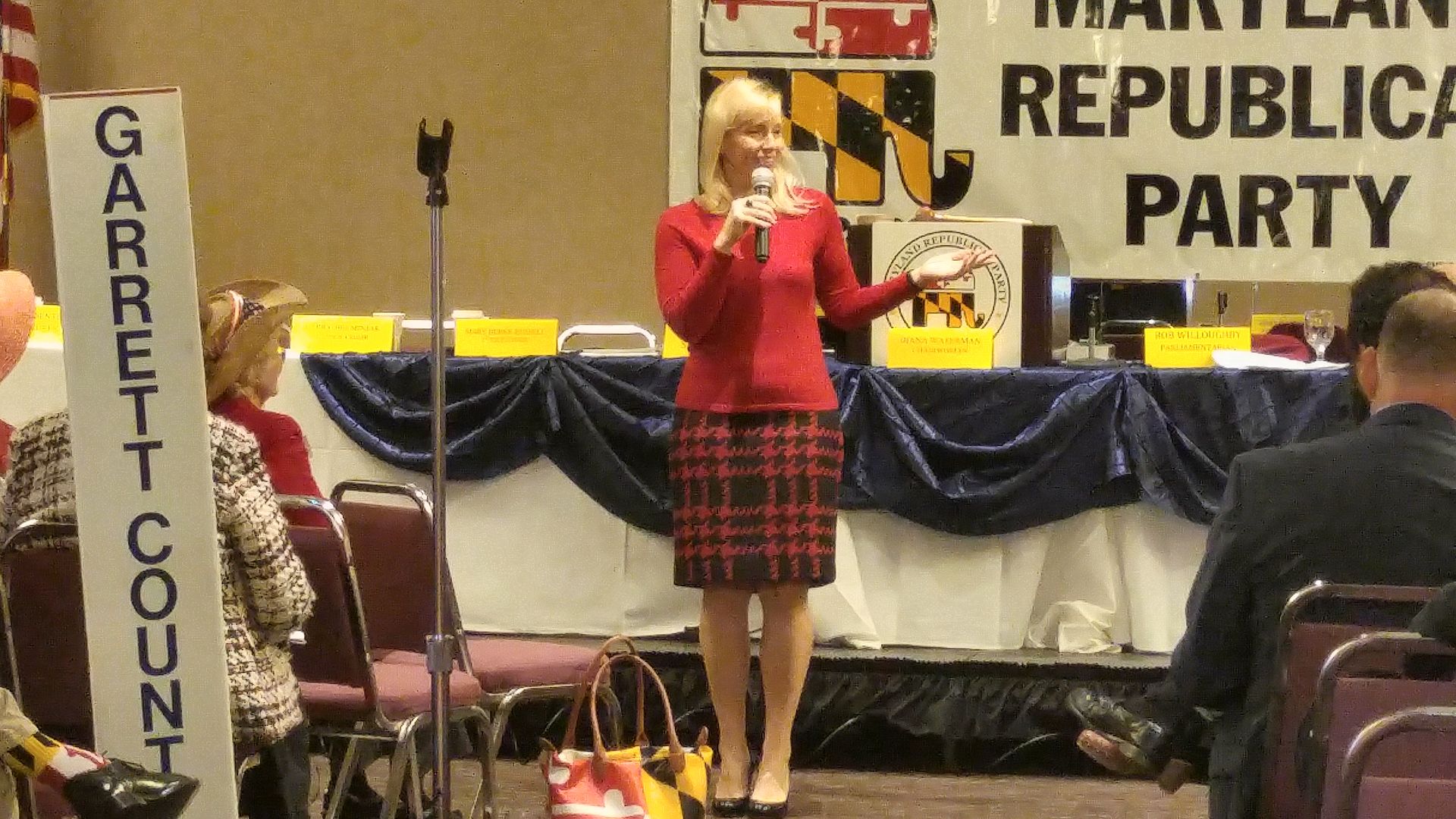
There we discussed two somewhat disparate but vital topics: grassroots organizing and public speaking. On the latter, we did a pair of “American Idol” style auditions where “contestants” were judged and advised on a two-minute speech. It’s really hard to talk for two minutes.
I didn’t take a photo at the second one, but Justin Ready spoke on some of these same topics and more.
Not taking Justin’s photo means I have a cleaner lead into the National Committeewoman’s report Nicolee delivered to start the afternoon.
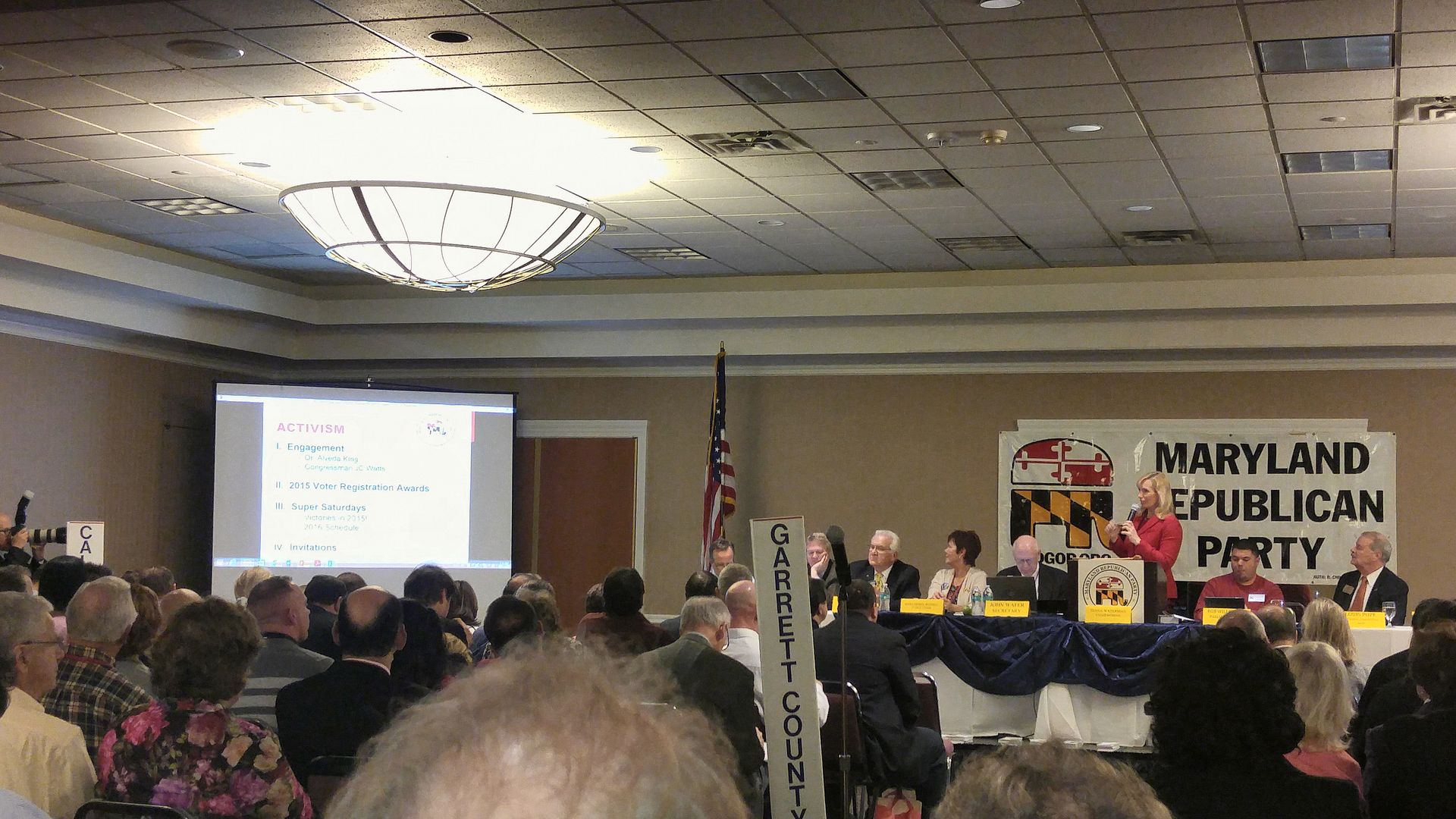
Nicolee pointed out some of our engagement events featuring Alveda King and J.C. Watts in Baltimore City, adding that getting Republican totals to 25% there makes us a red state. She also announced the winners of our voter registration contest for various-sized counties.
Ambrose was happy about going “2 for 2” with her Super Saturdays, winning with both Michael Esteve in Bowie and Muir Boda right here in Salisbury. “This man was an animal” when it came to door-knocking, said Ambrose of Boda. She also praised Patrick McGrady for winning for mayor in Aberdeen.
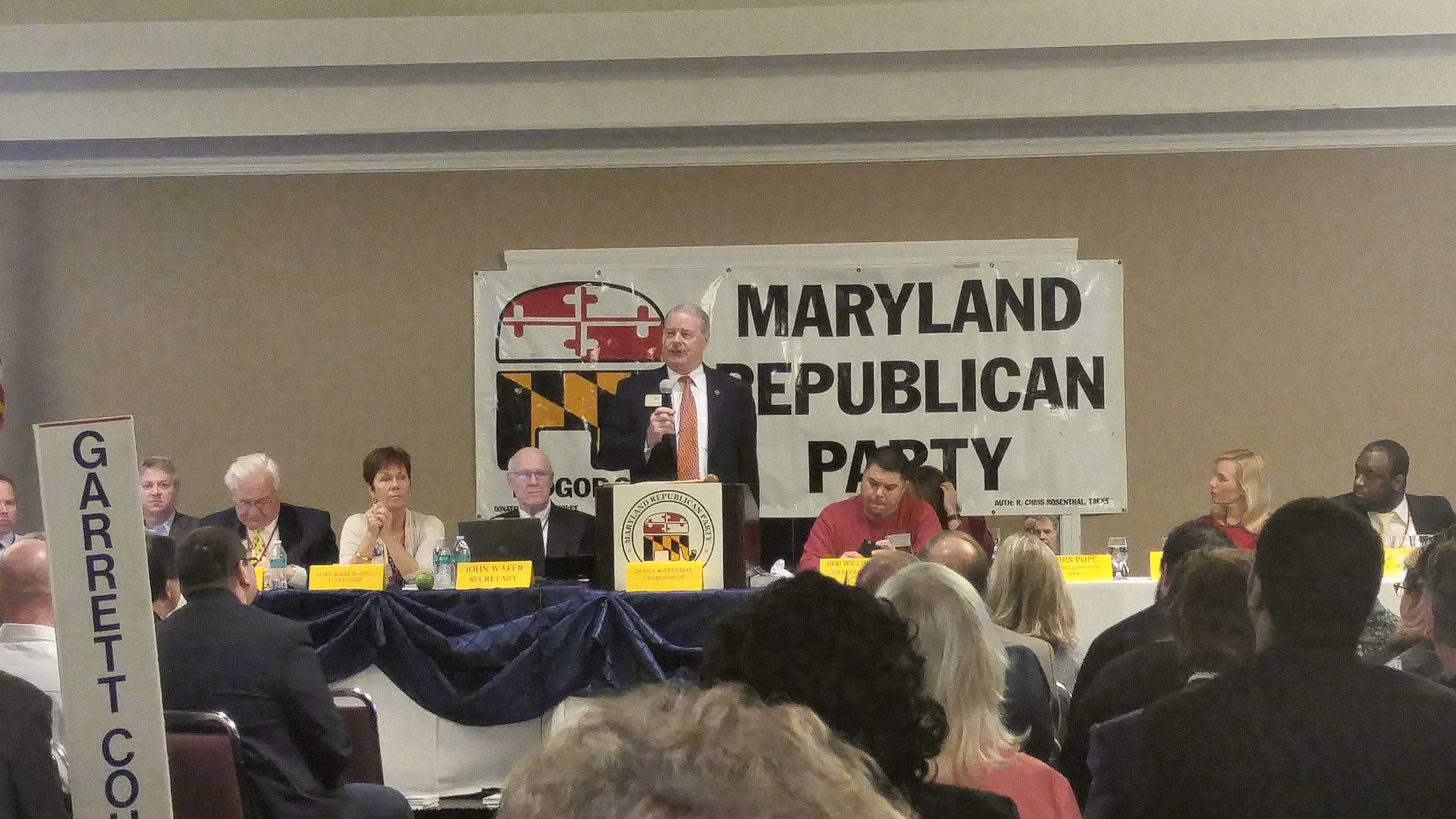
A man who hosted a “phenomenal” house party, according to Diana Waterman, Louis Pope gave the National Committeeman’s report.
He focused more on the national scene, saying the RNC was “far more viable” than at any other point in history. And although this success wasn’t being picked up by the mainstream media, the ground game was “going exceedingly well…our turnout machine is working.” Now we had 32 GOP governors, added Pope.
Noting the CNBC debate showed “how unbelievably biased” the media is, Pope opined the primary season would be over by April 30. After that, it was “absolutely essential” that we come together. “Next year’s election will be a battle royal,” said Pope. The RNC has “a very deep playbook” on Hillary, Louis added.
On a local level, Pope urged the Central Committee members to raise money this year for the 2018 elections, since there’s not much competition for funding. This year’s campaign, though, will require “sweat equity,” said Pope.
We heard a quick report from College Republican Chair Christine McElroy, detailing their successes – including the Salisbury University CRs co-sponsoring our Lincoln Day Dinner. But she also revealed the sad fact that 77% of millennials could not identify even one of their home state Senators.
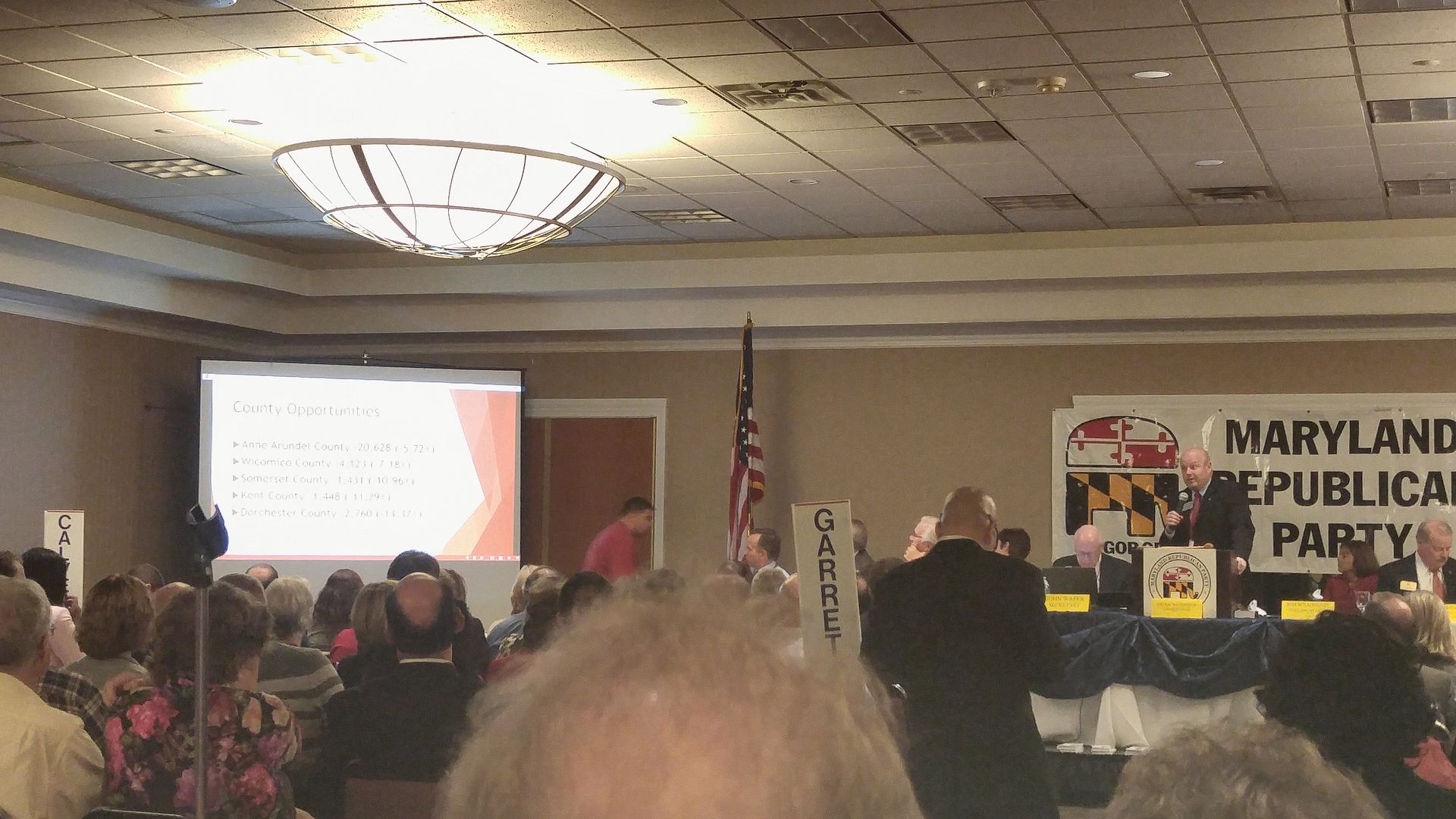
Party Executive Director Joe Cluster went over voter registration, pointing out the five counties (including Wicomico) where the GOP is closest to overtaking Democrats. “The numbers are moving in our direction,” said Cluster. He also touched on goals for precinct captains, opportunities to help Governor Hogan on boards and commissions, and the Baltimore city elections.
In her Chair’s report, Diana Waterman paid tribute to the late Frank McCabe, for whom the party would have a dinner later that evening. But she stressed the need to pass the first bylaws amendment, believing if we fail to adopt this the General Assembly will take the right away. “It is for your protection,” said Diana.
First we had to deal with one resolution in support of a Constitutional amendment to reform redistricting. It passed by a voice vote, with just one or two objections.
In introducing the first bylaw amendment, Mark Edney of Wicomico County stressed that “we have a problem with the process.” The proposal provides a process but is not specific.
While there was spirited debate on both sides, in the end the measure had enough votes to pass. On the weighted voting scale it was 369-170, which exceeded the 2/3 majority required. (In terms of actual people, the vote was 182-85. Only Baltimore City, Frederick, Queen Anne’s, and Washington counties had a majority objecting.) All nine in Wicomico County voted in favor, although I believe we will create our own specific guidelines.
On the “loser pays” amendment, an attempt to change it to cover both sides was proposed but was superseded by a motion to table the amendment, which passed with a resounding voice vote.
And then we had bylaw amendment #3. I thought it would pass with little objection, but the fireworks began right away. Most of the argument centered on whether the Black Republican group was established enough – those arguing against the amendment frequently referred to the Young Republicans, which reached a low point in chapters and membership shortly after getting an Executive Committee vote.
At first we voted on a motion to recommit to the Bylaws Committee, which drew the argument that it came from that committee. But Heather Olsen explained that the committee got this at the last minute and only checks for conformance, not on merits. In the end, the motion to recommit failed 217-324, or 114-156 in bodies. Wicomico was split 5-4 against recommitting.
Then we tried to table it, but that motion was rejected by voice vote.
The next move was to amend the bylaw to strip the voting rights from every one of the auxiliary organizations. That started new debarte, including a motion to continue debate that lost soundly in a voice vote.
The final motion to amend passed 359-178, with the amended bylaw change passing 408-83. (Body counts were 178-91 and 206-41.) Only Calvert, St. Mary’s, Wicomico, and Worcester voted against both.
Once that vote was in, the bylaws committee report was done “after 2 hours and 3 minutes.” Before we adjourned, Diana Waterman told us it should never be said we don’t allow enough debate.
But I suspect the debate will go on. I’ll have more thoughts later this week.
Oh, and another thing. We did a straw poll, with Ted Cruz the winner.
- Ted Cruz – 62 votes (24%)
- Marco Rubio – 52 (20%)
- Donald Trump – 49 (19%)
- Ben Carson – 26 (10%)
- Carly Fiorina – 18 (7%)
- Rand Paul – 15 (6%)
- Chris Christie – 14 (5%)
- John Kasich – 12 (5%)
- Jeb Bush – 11 (4%)
- Mike Huckabee – 2 (1%)
- Rick Santorum – 2 (1%)



